Write an essay in French
Beyond the fact that writing an essay in French can be a good practice to improve your writing, you may also be asked to write one during your schooling. So, it is important to study the topic of French essay writing and get some useful tips..
» Tips and tricks for your French essay » The structure of a French essay » Sample French Essay

Tips and tricks for your French essay
When writing a French essay for school, you should always use a structured approach and good French skills to present your arguments in a focused way. Beyond French skills, there are also important formal requirements for a successful French essay. We will come back to this in detail later. First, you will find some useful tips and tricks that will help you write more compelling and better French essays in the future.
- Have a clear thesis and structure
- Do sufficient research and use reliable sources
- Use examples and arguments to support your thesis
- Avoid plagiarism and cite correctly
- Always check structure, grammar and spelling
When you write your essay at school or university, you need to make sure that the general structure of your essay, the presentation of the arguments and, above all, your French language skills play a role in the mark you will get. This is why you should definitely take a closer look at the structure of an essay as well as the most important grammar rules and formulations for French essays.
The structure of a French essay
In an essay, you deal at length and in detail with a usually given topic. When you write an essay in French, you must follow a certain structure. Below we show you what this structure looks like and give you some tips for writing the most important parts of your essay.

The Introduction
The introduction prepares the main body of your essay. You think of a meaningful title for your essay, you describe your thesis or your question, you give general information on the subject and you prepare your argument by giving an overview of your most important arguments.
Below are examples and phrases that you can use to write the introduction to your essay in French.
The title should be meaningful, concise and reflect the content of the essay.
Introductory paragraph
The first paragraph of your French essay should briefly introduce the topic and engage the reader. Here are some examples to help you write your essay:
Proposal or question
The central proposition or question of your French essay should be a clear and concise definition of the purpose of the essay. Use these examples to get a clearer idea of how to write theses in French:
Overview of Arguments and Structure
At the end of your introduction, describe the structure of the main part of your essay (your outline) and outline your argument. Here are some French expressions that will certainly help you write your essay:
The body of your essay

The main part of your French essay deals with the given topic in detail. The subject is studied from all angles. The main body of your essay follows a thread of argument and discusses in detail the main arguments of your thesis previously made in the introduction.
In the body of the text, you should discuss the subject of your essay in clear and concise language. To achieve this, we give you some wording aids as well as vocabulary and phrases that you can use to write your essay in French.
Formulation tools:
French vocabulary for essays.
In the conclusion of your French essay, you address the thesis of your essay, summarize the main points of your discussion in the main body, and draw a conclusion. On the basis of the arguments and the resulting conclusions, you formulate in the conclusion of your dissertation final thoughts and suggestions for the future. It is important that you do not add new information or new arguments. This should only be done in the body of your text.
Here are some wording guides to help you write your essay in French:
Sample French Essay
Les avantages des voyages linguistiques
Malgré les difficultés potentielles, les voyages linguistiques offrent aux apprenants une occasion unique d'améliorer leurs compétences linguistiques et de découvrir de nouvelles cultures, ce qui en fait un investissement précieux pour leur développement personnel et académique.
Les séjours linguistiques sont des voyages organisés dans le but d'améliorer les compétences linguistiques des participants. Ces voyages peuvent se dérouler dans le pays ou à l'étranger et durer d'un week-end à plusieurs semaines. L'un des principaux avantages des séjours linguistiques est l'immersion. Entourés de locuteurs natifs, les apprenants sont contraints de pratiquer et d'améliorer leurs compétences linguistiques dans des situations réelles.Il s'agit d'une méthode d'apprentissage beaucoup plus efficace que le simple fait d'étudier une langue dans une salle de classe.
Un autre avantage des séjours linguistiques est l'expérience culturelle. Voyager dans un nouveau pays permet aux apprenants de découvrir de nouvelles coutumes, traditions et modes de vie, et de se familiariser avec l'histoire et la culture du pays. Cela enrichit non seulement l'expérience d'apprentissage de la langue, mais contribue également à élargir les horizons et à accroître la sensibilisation culturelle.
Cependant, les séjours linguistiques peuvent également présenter des inconvénients. Par exemple, le coût du voyage et de l'hébergement peut être élevé, en particulier pour les séjours de longue durée. En outre, les apprenants peuvent être confrontés à la barrière de la langue ou à un choc culturel, ce qui peut être difficile à surmonter. Le coût et les difficultés potentielles des séjours linguistiques peuvent sembler décourageants, mais ils offrent des avantages précieux en termes d'épanouissement personnel et scolaire.
Les compétences linguistiques et les connaissances culturelles acquises peuvent déboucher sur de nouvelles opportunités d'emploi et améliorer la communication dans un cadre professionnel. Les bourses et les aides financières rendent les séjours linguistiques plus accessibles. Le fait d'être confronté à une barrière linguistique ou à un choc culturel peut également être l'occasion d'un développement personnel. Ces avantages l'emportent largement sur les inconvénients et font des séjours linguistiques un investissement qui en vaut la peine.
En conclusion, malgré les difficultés potentielles, les séjours linguistiques offrent aux apprenants une occasion unique d'améliorer leurs compétences linguistiques et de découvrir de nouvelles cultures, ce qui en fait un investissement précieux pour le développement personnel et académique. Qu'il s'agisse d'un débutant ou d'un apprenant avancé, un voyage linguistique est une expérience à ne pas manquer.
Improve your writing style in French
Learn French with us. We will help you improve your writing skills.

Improve your French with Sprachcaffe

A Year abroad for high school students
Spend a unique school year abroad

Online French courses
Learn French from the comfort of your own home with an online course

Learn French on a language trip
Learn French in a French-speaking country
You are using an outdated browser. Please upgrade your browser or activate Google Chrome Frame to improve your experience.
A Simple Guide to Talking About School in French
Whether you’re navigating a new French class, preparing for the speaking portion of a test like the GCSE or making friends with French-speaking students , it’s important to know lots of school vocabulary.
In this post I’ll give you a list of useful school-related vocabulary, with more than 100 words for people, places and things you’ll need to know for talking about school in French.
People at School
Levels of schooling, school subjects, rooms in a school building, school supplies, school assignments, and one more thing....
Download: This blog post is available as a convenient and portable PDF that you can take anywhere. Click here to get a copy. (Download)

L’étudiant / L’étudiante – Student
Le/ La camarade de classe – Classmate
Le professeur – Teacher/Professor
L’entraîneur – Coach
L’infirmier / L’infirmière – Nurse
Le proviseur / Le chef d’établissement – Principal or Headmaster
Le proviseur adjoint – Vice Principal

L’école – School
L’école public – Public school
L’école privée – Private school
L’école de langue – Language school
L’école maternelle – Preschool
L’école primaire – Primary school
Le collège – Middle school
Le lycée – High school
L’université / la fac – College
L’université is the official term for “college,” but many French people casually refer to college as la fac .
Je suis à la fac cette année. (I am in college this year.)
L’école supérieure de troisième cycle – Graduate school
Le doctorat – Doctorate degree
La faculté de médecine – Medical school
La faculté de droit – Law school
Je vais au / à la … – I go to …
Je vais au lycée. (I go to high school.)
Je vais à la fac de médecine. (I go to med school.)

Le cours préparatoire or CP – First grade
Le cours élémentaire 1re année or CE1 – Second grade
Le cours élémentaire 2e année or CE2 – Third grade
Le cours moyen 1re année or CM1 – Fourth grade
Le cours moyen 2e année or CM2 – Fifth grade
La sixième – Sixth grade
La cinquième – Seventh grade
La quatrième – Eighth grade
La troisième – Ninth grade
La seconde – 10th grade
La première – 11th grade
La terminale – 12th grade
La première année d’université – First year of college
La seconde année d’université – Second year of college
La troisième année d’université – Third year of college
La quatrième année d’université – Fourth year of college
Être en – To be in [grade]
Mon fils s’appelle Daniel. Il est en CM1. (My son’s name is Daniel. He is in fourth grade.)
Je suis en première année à l’université. (I am in my first year of college.)

Le français – French
L’anglais – English
L’espagnol – Spanish
L’allemand – German
Le latin – Latin
Les maths – Math
Les sciences – Science
L’éducation physique – PE
L’histoire – History
La géographie – Geography
La biologie – Biology
La physique – Physics
La chimie – Chemistry
L’algèbre – Algebra
La géométrie – Geometry
Le calcul – Calculus
Les arts plastiques – Art
La musique – Music
Le théâtre – Theater
La chorale – Choir
L’orchestre – Band
La littérature – Literature
L’écriture créative – Creative writing
La médecine – Medicine
Le droit – Law
J’ai … maintenant. – I have … now.
Je dois partir! J’ai chimie maintenant . (I have to leave! I have chemistry now.)
J’ai espagnol à 9h. (I have Spanish at 9am)
Je suis un cours de… – I am taking a course in…
Je suis un course d ‘écriture créative cette année. (I am taking a creative writing course this year.)
Note that the verb used here is suivre (literally, “to follow”), not être (to be).
J’aime… – I like…
J’aime le théâtre. C’est mon cours préféré! (I like theater. It is my favorite class!)
Je n’aime pas – I don’t like …
Je n’aime pas la géographie. C’est barbant! (I don’t like geography. It’s boring!)

La salle de classe – Classroom
Le bureau – Office
Le bureau du proviseur – Principal’s office
L’infirmerie – Nurse’s office
Le gymnase – Gym
La cafétéria / la cantine – School cafeteria
Le resto-U – University cafeteria
La résidence universitaire – Dormitory
Le laboratoire / le labo – Laboratory
L’amphithéâtre / l’amphi – Lecture hall
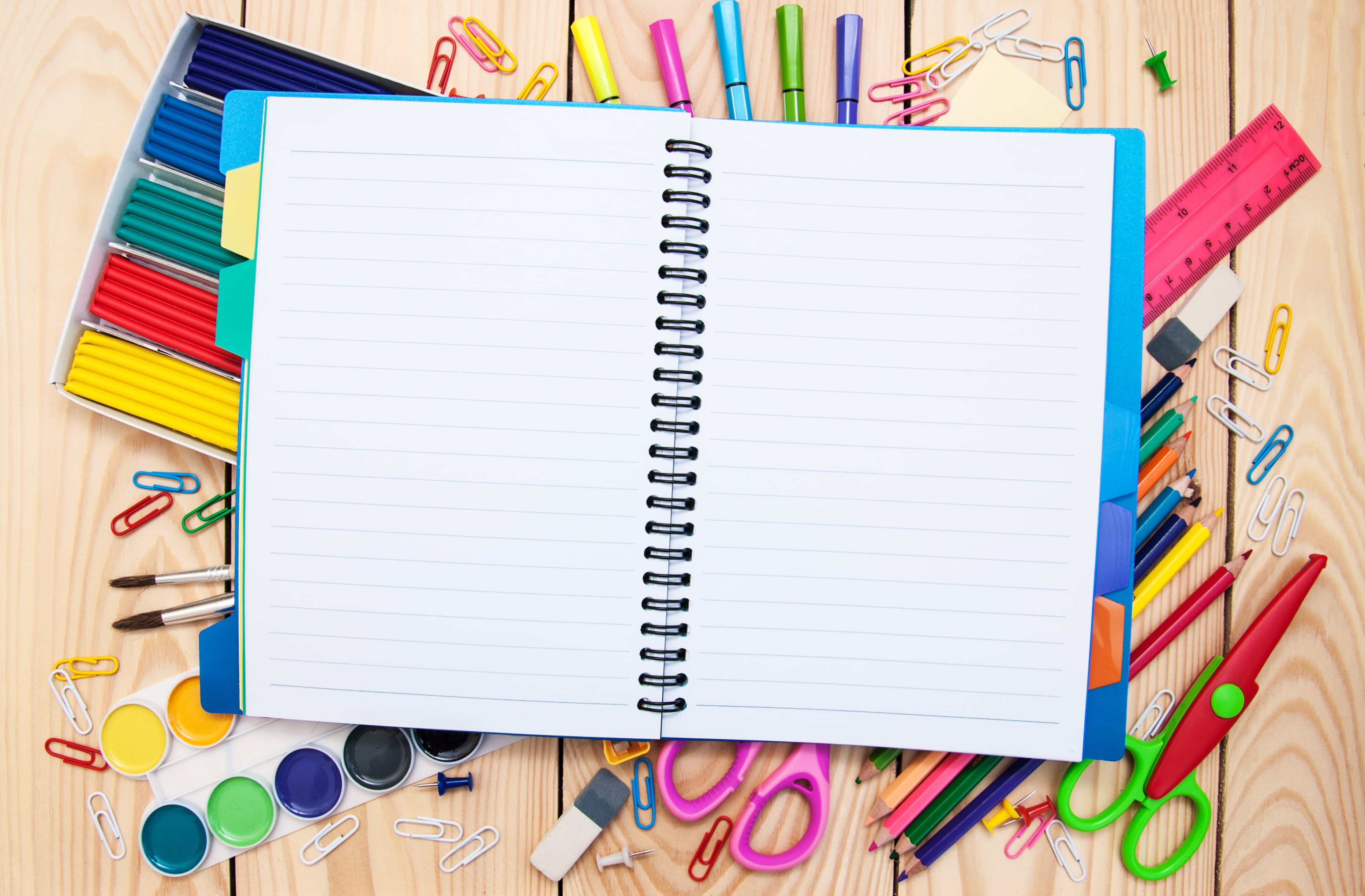
Le cahier / le carnet – Notebook
Le manuel – Textbook
Le classeur – Binder/folder
Le stylo – Pen
Le crayon – Pencil
La calculatrice – Calculator
L’ordinateur – Computer
Le portable – Laptop
Le sac à dos – Backpack
Le surligneur – Highlighter
La gomme – Eraser
La craie – Chalk
Le marqueur – Felt tip marker
L’éponge – Eraser for the chalkboard or whiteboard
La colle – Glue
Les crayons de couleur – Colored pencils
Les crayons gras – Crayons
La règle – Ruler
Les fiches – Index cards
La gamelle – Lunchbox
Le papier – Paper
Le papier millimétré – Graph paper
Le correcteur fluide – White-out
Les ciseaux – Scissors
L’agrafeuse – Stapler

Le devoir – Assignment/paper
Les devoirs – Homework
Yes, a specific assignment and homework in general (which may include multiple assignments) are differentiated simply by making the word plural. Languages are weird, aren’t they?
L’interro – Quiz
L’examen – Exam/test
L’attestation de DELF /DALF – DELF/DALF certification
If you study abroad or study at a language school, you might try to earn your DELF or DALF certification .
DELF stands for Diplôme d’études en langue française , or “Diploma in French Studies.” DALF stands for Diplôme approfondi de langue française , or “Diploma in Advanced French.”
Le discours – Speech
Le diplôme – Degree
J’ai un diplôme en… – I have a degree in…
J’ai un diplôme en pédagogie de langue française. (I have a degree in French education.)
À rendre… – Due
Mes devoirs de sciences sont à rendre demain. (My science homework is due tomorrow.)
Désolé, je ne peux pas sortir ce soir. J’ai un long devoir à rendre cette semaine. (Sorry, I can’t go out tonight. I have a long paper due this week .)
FluentU takes authentic videos—like music videos, movie trailers, news and inspiring talks—and turns them into personalized language learning lessons.
You can try FluentU for free for 2 weeks. Check out the website or download the iOS app or Android app.
P.S. Click here to take advantage of our current sale! (Expires at the end of this month.)

Try FluentU for FREE!
Now you can use these terms and basic phrases in French conversations about school!
FluentU has a wide variety of great content, like interviews, documentary excerpts and web series, as you can see here:

FluentU brings native French videos with reach. With interactive captions, you can tap on any word to see an image, definition and useful examples.

For example, if you tap on the word "crois," you'll see this:

Practice and reinforce all the vocabulary you've learned in a given video with learn mode. Swipe left or right to see more examples for the word you’re learning, and play the mini-games found in our dynamic flashcards, like "fill in the blank."

All throughout, FluentU tracks the vocabulary that you’re learning and uses this information to give you a totally personalized experience. It gives you extra practice with difficult words—and reminds you when it’s time to review what you’ve learned.
Start using the FluentU website on your computer or tablet or, better yet, download the FluentU app from the iTunes or Google Play store. Click here to take advantage of our current sale! (Expires at the end of this month.)
Enter your e-mail address to get your free PDF!
We hate SPAM and promise to keep your email address safe


Published on October 6th, 2023 | by Adrian Lomezzo
How to Write an Essay in French Without Giving Yourself Away as a Foreigner

Image source: https://www.pexels.com/photo/close-up-shot-of-a-quote-on-a-paper-5425603/
Bienvenue! Do you dream of unleashing your inner French literary genius, but worry that your writing might inadvertently reveal your foreign roots? Fret not, mes amis, as we have the ultimate guide to help you master the art of essay writing en Français!
Within these pages, we’ll navigate the intricate waters of linguistic nuances, cultural subtleties, and grammatical finesse, allowing you to exude the aura of a native French speaker effortlessly. Many students like you have embarked on this journey, seeking academic assistance from platforms like https://paperwritten.com/ to conquer their writing pursuits.
From crafting a compelling introduction to fashioning impeccable conclusions, we’ll unveil the secrets that will leave your professors applauding your newfound linguistic prowess. So, bid adieu to those awkward linguistic giveaways and embrace the sheer elegance of French expression – all while keeping your foreign identity beautifully concealed! Let’s embark on this adventure together and unlock the true essence of writing like a native French virtuoso.
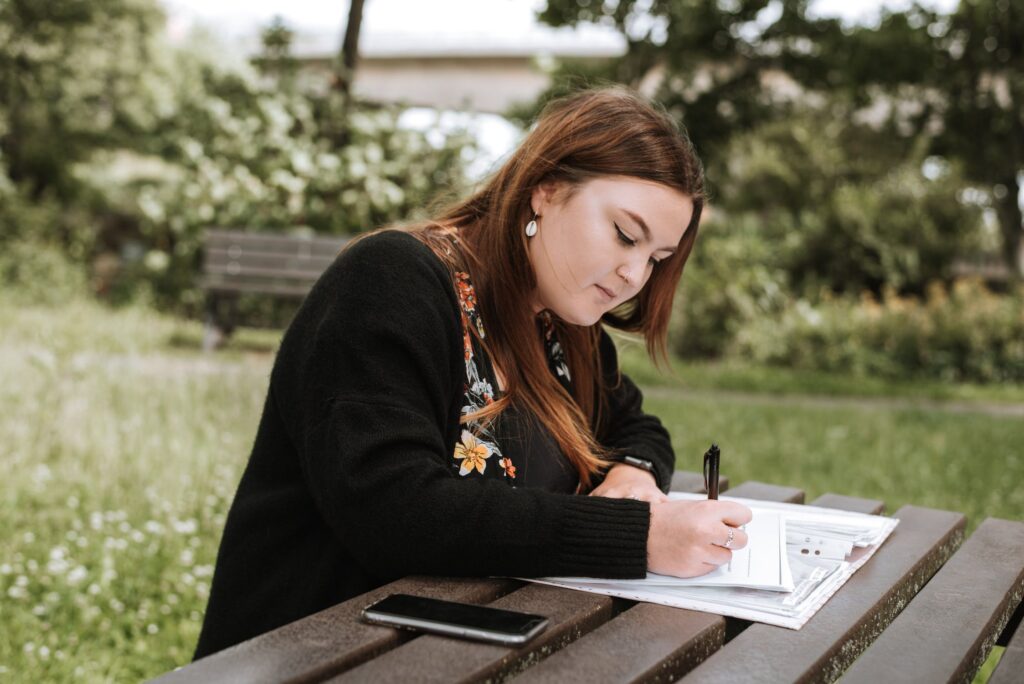
1. Mastering French Grammar and Vocabulary: Building a Strong Foundation
To create a compelling French essay, it’s essential to lay a solid groundwork. Ensure that your French grammar is accurate and that you possess a rich vocabulary. Avoid relying on online translators, as they may yield awkward or incorrect sentences. Instead, embrace reputable dictionaries and language resources to enhance your language skills effectively.
2. Mimic Sentence Structures: The Art of Authentic Expression
To truly immerse yourself in the French language, observe and mimic the sentence structures used by native speakers. Analyzing essays written by experienced writers can prove invaluable in grasping the authentic style required to compose a captivating essay.
3. Use Transition Words: Crafting a Smooth Flow of Ideas
In French essays, the use of transition words and phrases plays a pivotal role in connecting ideas seamlessly. Incorporate expressions like “de plus,” “en outre,” “en conclusion,” “tout d’abord,” and “par conséquent” to add coherence and elegance to your writing.
4. Embrace French Idioms and Expressions: Unveiling Cultural Fluency
Demonstrate a deeper understanding of the French language and culture by incorporating idioms and expressions where appropriate. However, remember to use them sparingly to avoid overwhelming your essay.
5. Pay Attention to Formality: Striking the Right Tone
Tailor the formality of your writing to suit the context of your essay. Whether you are crafting an academic piece or a more personal creation, be mindful of your choice of vocabulary and sentence structures to match the required tone.
6. Research Cultural References: The Power of In-depth Knowledge
If your essay touches upon French culture, history, or literature, extensive research is key. Delve into your subjects to avoid mistakes and showcase your genuine interest in the matter at hand.
7. Avoid Direct Translations: Let French Be French
To avoid awkward phrasing, strive to think in French rather than translating directly from your native language. This will lead to a more natural and eloquent essay.
8. Practice Writing Regularly: The Path to Proficiency
Mastering the art of French writing requires regular practice. Embrace writing in French frequently to grow more comfortable with the language and refine your unique writing style.
9. Read French Literature: A Gateway to Inspiration
Explore the world of French literature to expose yourself to diverse writing styles. This practice will deepen your understanding of the language and immerse you further in French culture and history.
10. Connect with French Culture: Bridges of Cultural Resonance
Incorporate cultural references that resonate with French readers, such as art, cuisine, festivals, historical figures, or social customs. Authenticity is key, so avoid relying on stereotypes.

11. Use a French Thesaurus: Expanding Your Linguistic Palette
Discovering new contextually appropriate words can elevate your writing. Embrace a French thesaurus to find synonyms that may not be apparent through direct translations.
12. Master French Punctuation: The Finishing Touch
Take care to use correct French punctuation marks, such as guillemets (« ») for quotes and proper accent marks. These subtle details add a professional touch to your essay.
13. Practice French Rhetorical Devices: Crafting Eloquent Prose
Experiment with rhetorical devices like parallelism, repetition, and antithesis to lend depth and sophistication to your writing.
14. Pay Attention to Word Order: Unlocking French Sentence Structure
French boasts a unique sentence structure distinct from English. Dive into the intricacies of subject-verb-object order and grasp the art of organizing sentences to sidestep common foreign mistakes. Embracing this essential aspect will elevate your writing to a truly native level.
15. Use French Idiomatic Expressions: Infuse Cultural Flair
Enrich your prose with the colorful tapestry of French idioms, reflecting the vibrant essence of the culture. Yet, a word of caution – wield them with finesse, for the strategic placement of an idiom can imbue your essay with unparalleled flair and authenticity.
16. Master Pronouns and Agreement: The Dance of Language
The dance of pronouns, nouns, and adjectives requires your keen attention. Like a skilled performer, ensure their seamless alignment to avoid inadvertently revealing your non-native status. Mastering this harmony is key to writing like a true Francophone.

17. Understand Subtle Connotations: Unveiling Linguistic Shades
Delve into the labyrinth of French words, where subtle connotations diverge from their English counterparts. Familiarize yourself with these delicate nuances, for it is in their mastery that your writing shall find refinement.
18. Study Formal and Informal Registers: Tailoring Language to Purpose
Akin to selecting the perfect outfit for each occasion, comprehend the art of using formal and informal language. Consider your essay’s purpose and audience, and with this knowledge, enhance your authenticity, seamlessly aligning with the appropriate linguistic register.
19. Practice Dialogue Writing: Conversing with Eloquence
Embark on the journey of dialogue writing to enrich your linguistic repertoire. As you hone your conversational skills, watch as authenticity gracefully weaves itself into your written work, enchanting readers with its charm.
20. Seek Feedback: A Second Set of Eyes
To refine your essay further, seek the guidance of a native French speaker or language tutor from the best cheap essay writing services . Their valuable feedback can uncover any language or cultural mistakes you may have made, allowing you to make necessary improvements.
Equip yourself with these priceless tips and set forth on your quest to master the art of French writing. Embrace the language’s allure, immerse in its rich culture, and watch your words flow with grace and poise. À la plume! Let the pen become your ally in crafting captivating prose that echoes with authenticity and charm.
Header Photo Credit by George Milton: https://www.pexels.com/photo/smiling-woman-in-eyeglasses-with-books-7034478/
About the Author
Adrian Lomezzo is a content writer and likes to write about technology and education. He understands the concern of parents due to the evolving technology and researches deeply in that area. When he is not researching, he buries himself in books along with his favorite cup of hot chocolate.
Related Posts

Veronique Gallo On Tour With Her Latest Show “Femme De Vie” In California →

Beyond Shakespeare: Expanding Horizons with London’s Diverse Theatre Scene →

Three French authors from San Diego present their new books →

Martine Couralet-Laing reveals behind the scenes of the city of angels in DreamLAnd →
Leave a comment cancel reply.
Your email address will not be published. Required fields are marked *

Welcome to French Quarter Magazine (FQM) – your passport to a journey through France, the United States and beyond!
French Quarter Magazine is a dynamic bilingual publication, based in Las Vegas, that celebrates the finest in art, culture, entertainment, lifestyle, fashion, food, travel, sports and history. Whether you're longing for a taste of Parisian elegance or the vibrancy of American culture, we've got you covered.
Our mission is to create a link and to bridge the gap between the United States and France by promoting exchanges and offering a unique reading experience through our bilingual publication. From the charming streets of Paris to the bustling avenues of New York City, our articles provide a captivating exploration of diverse cultural landscapes. Written by our dedicated team of contributors from around the world, they cover everything from the latest places to visit or stay, to new spectacles and exhibitions, to the opening of exciting restaurants or stores, fashion trends, and the nuanced history of French-American relations.
With a focus on women empowering women and excellence, we showcase individuals who make a positive impact in our communities. Through cultural events, conferences, and engaging content, we strive to enrich understanding of history, culture, and the arts, while preserving and transmitting valuable skills and knowledge.
At French Quarter Magazine, we cherish culture as a precious and diverse treasure that should be celebrated. That's why we provide a platform for individuals and businesses with interests in both countries to connect, network, and engage. Through our engaging content and cultural events, we strive to foster understanding and appreciation of the unique qualities of each culture, while also highlighting their shared values.
So why not join us on a journey of discovery? Whether you're seeking inspiration or information, French Quarter Magazine is the perfect publication for you.
Step into a world of lifestyle, entertainment, cultural exchanges with French Quarter Magazine! Subscribe today to receive our weekly newsletters and special offers, and step into a world of endless possibilities.

PROMOTE MY BUSINESS
Donate we need your help, become an ambassador, virtual and in-person events with fqm, your opinion matters , learning french, recent posts.

RECENT COMMENTS
Merci pour votre commentaire intéressant, Annick ! Désolée pour la réponse tardive. Nous avons dû restructurer notre équipe. Nous sommes…
Thank you for your continued support and for being a regular visitor to our website, Cameron! Sorry for the late…
Bonjour! Nous sommes ravis que vous ayez apprécié l'article ! Désolée pour la réponse très tardive. Nous avons dû restructurer…
Thank you for sharing that interesting piece of information, Mike! As for "Alors on Danse" by Stromae, while it didn't…
Thank you so much, Jaya! I'm delighted that you enjoyed the article and found it informative. Exploring the cultural differences…
©2023 French Quarter Magazine
- Sponsorships, Partnerships and Advertising
- Privacy Policies
How to Write an Excellent French Essay (Resources Included)
Tips to write an excellent french essay.
Writing essays is challenging enough, but when you are asked to write a French essay, you are not only being asked to write in a foreign language, but to follow the conventions of another linguistic and literary tradition. Like essay-writing in any language, the essential part of writing a French essay is to convey your thoughts and observations on a certain topic in a clear and concise manner. French essays do come out of a certain tradition that is part of the training of all students who attend school in France – or at least secondary school – and when you are a French essay, it is important to be aware of this tradition.

The French philosopher Michel de Montaigne is credited with popularizing the essay form as a literary genre. His work, Essais, first published in 1580, and undergoing several subsequent publications before his death in 1592, covers a wide breadth of topics, ranging from “amitié” to “philosopher c’est apprendre à mourir”, and includes many literary references, as well as personal anecdotes. The name for this genre, essai, is the nominal form of the verb essayer, “to attempt”. We have an archaic English verb essay, meaning the same thing. The limerick that includes the phrase, “... when she essayed to drink lemonade ...” indicates an attempt to drink a beverage and has nothing to do with writing about it. But the writing form does illustrate an attempt to describe a topic in depth with the purpose of developing new insights on a particular text or corpus.
French instructors are very specific about what they would like when they ask for an essay, meaning that they will probably specify whether they would like an explication de texte, commentaire composé, or dissertation. That last essay form should not be confused with the document completed for a doctorate in anglophone countries – this is called a thèse in French, by the way. There are different formats for each of these types of essay, and different objectives for each written form.
Types of Essay
1. l’explication de texte.
An explication de texte is a type of essay for which you complete a close reading. It is usually written about a poem or a short passage within a larger work. This close reading will elucidate different themes and stylistic devices within the text. When you are completing an explication de texte, make sure to follow the structure of the text as you complete a close examination of its form and content. The format for an explication de texte consists of:
i. An introduction, in which you situate the text within its genre and historical context. This is where you can point out to your readers the general themes of the text, its form, the trajectory of your reading, and your approach to the text.
ii. The body, in which you develop your ideas, following the structure of the text. Make sure you know all of the meanings of the words used, especially the key terms that point to the themes addressed by the author. It is a good idea to look words up in the dictionary to find out any second, third, and fourth meanings that could add to the themes and forms you describe. Like a student taking an oral examination based on this type of essay writing, you will be expected to have solid knowledge of the vocabulary and grammatical structures that appear in the text. Often the significance of the language used unfolds as you explain the different components of theme, style, and composition.
iii. A conclusion, in which you sum up the general meaning of the text and the significance of the figures and forms being used. You should also give the implications of what is being addressed, and the relevance of these within a larger literary, historical, or philosophical context.
NB: If you are writing about a poem, include observations on the verse, rhyme schemes, and meter. It is a good idea to refer to a reference work on versification. If you are writing about a philosophical work, be familiar with philosophical references and definitions of concepts.
Caveat: Refrain from paraphrasing. Instead show through careful analysis of theme, style, and composition the way in which the main ideas of the text are conveyed.
2. Le commentaire composé
A commentaire composé is a methodologically codified commentary that focuses on themes in a particular text. This type of essay develops different areas of reflection through analytical argument. Such argumentation should clarify the reading that you are approaching by presenting components of the text from different perspectives. In contrast to the explication de texte, it is organized thematically rather than following the structure of the text to which it refers. The format for a commentaire composé consists of:
i. An introduction, in which you present the question you have come up with, often in relation to a prompt commenting on a thematic or stylistic aspect of the text, such as “Montrez en quoi ce texte évoque l’amour courtois” or “Qu’apporte l’absence de la ponctuation dans ce texte ?” In this section, you will be expected to delineate your approach to the text and illustrate the trajectory of your ideas so that your readers will have a clear idea of the direction these ideas will take.
ii. A tripartite body, in which you explore the question you have come up with, citing specific examples in the text that are especially pertinent to the areas of reflection you wish to explore. These citations should be explained and connected to the broad themes of your commentary, all the while providing details that draw the readers’ attention to your areas of inquiry. These different areas of inquiry may initially seem disparate or even contradictory, but eventually come together to form a harmonious reading that addresses different aspects of the text. The more obvious characteristics of the text should illuminate its subtler aspects, which allows for acute insight into the question that you are in the process of exploring.
iii. A conclusion, in which you evaluate your reading and synthesize its different areas of inquiry. This is where you may include your own opinions, but make sure that the preceding sections of your commentaire remain analytical and supported by evidence that you find in the text.
NB: Looking at verb tenses, figures of speech, and other aspects that contribute to the form of the text will help situate your reader, as will commenting on the register of language, whether this language is ornate, plain, reflects a style soutenu, or less formal patterns of speech.
Caveat: Quotations do not replace observations or comments on the text. Explain your quotations and situate them well within your own text.
3. La dissertation
The dissertation is a personal, organized, and methodical reflection on a precise question that refers to a corpus of writing. Referring to this corpus, you may be asked questions along the lines of “Que pensez-vous de l’équivalence entre l’amour et la chanson exprimée dans ces textes ?” or “Est-ce que la sagesse et la folie ont les mêmes sources?” This type of essay allows for an exploration of a question through knowledge of a corpus as well as through an individual’s cultural knowledge. The format for a dissertation consists of:
i. An introduction, in which you present the topic addressed, the significance of your argument, and the trajectory of your ideas.
ii. The body which, like a commentaire composé, consists of a tripartite development of your argument. This can follow any one of the following structures: a dialectical schema, organized into thèse, antithèse, and synthèse – an argument, its counter-argument, and its rebuttal; an analytical schema, consisting of the description of a situation, an analysis of its causes, and commentary on its consequences; a thematic schema, which consists of a reflection on a topic which you proceed to examine from different angles in an orderly fashion.
iii. A conclusion, in which you address the different ways in which you have approached the question at hand and how this deepens your insights, while placing the question within a broader context that shows room for expansion. The conclusion can open up the topic addressed to show its placement within a literary movement, or in opposition to another literary movement that follows it, for example.
NB: Approach the question at hand with as few preconceptions as possible. If you are writing on a quotation, gather all of your knowledge about its author, the work in which it appears, and the body of literature with which it is associated.
Caveat: Even for a personal reflection, such as a dissertation, avoid using the first person pronoun je. Nous or on are preferable. It is advisable not to switch from one to the other, though.
For each of these essay forms, it is a good idea to make an outline to which you can refer as you write. As your writing progresses, things may shift a bit, but having a structure on which you can rely as you gather your various ideas and information into a coherent argument provides solid foundation for a clear and well-developed essay. This also facilitates smooth transitions from one section of your essay to the next.
During your reading, you may encounter a problem, a contradiction, or a surprising turn of phrase that is difficult to figure out. Such moments in a text give you the opportunity to delve into the unique characteristics of the text or corpus to which you are referring, to propose different solutions to the problems you encounter, and to describe their significance within a larger literary, philosophical, and historical context. Essay writing allows you to become more familiar with French works, with their cultural significance, and with the French language. You can refer to the following resources to guide you in this endeavor:
Auffret, Serge et Hélène. Le commentaire composé. Paris: Hachette, 1991. Dufau, Micheline et Ellen D'Alelio. Découverte du poème: Introduction à l'explication de textes. New York: Harcourt, Brace & World, 1967. Grammont, Maurice. Petit traité de versification française. Paris: A. Colin, 2015. Huisman, Denis et L. R. Plazolles. L’art de la dissertation littéraire : du baccalauréat au C.A.P.E.S. Paris : Société d’édition d’enseignement supérieur, 1965.
The French newspaper Le Monde also has good articles on these essay forms that prepare French students for the baccalauréat exam: CLICK HERE
This is also a website with thorough information on essay writing techniques that prepare students for the baccalauréat exam: CLICK HERE
In addition, the University of Adelaide has tips for general essay writing in French: CLICK HERE
🇫🇷 Looking for More French Resources?
Train with Glossika and get comfortable talking in French. The more you listen and speak, the better and more fluent you will be.
Glossika uses syntax to help you internalize grammatical structures and you can build up your French vocabulary along with way. You'll also learn to communicate in real-life situations, and achieve fluency by training your speaking and listening!
Sign up on Glossika and try Glossika for free:

You May Also Like:
- 10 Great Tips to Prepare to Study in France
- How to Maintain French and Continue Learning by Yourself
- Differences Between Spoken French and Written French
Subscribe to The Glossika Blog
Get the latest posts delivered right to your inbox

Stay up to date! Get all the latest & greatest posts delivered straight to your inbox
French Your Way
Learn French Online | Learn French Melbourne | French Voices Podcast
How to Write The Perfect French Essay For Your Exam
November 16, 2014 by Jessica 3 Comments
Here are tips to help you write a great French essay with exam requirements in mind. Once you’re done, I strongly suggest you proofread your text using my checklis t.
Note: if you’re preparing for the French VCE, there is an updated version of these exam tips in my guide “How to Prepare for the French VCE & Reach your Maximum Score” .
While supervising exams or tutoring for exam preparation, I’ve seen too many students writing straight away on their exam copies. Stop! Resist the urge to jump on your pen and take a step back to make sure that you will be addressing all the exam requirements or you may be shooting yourself in the foot and lose precious points.
I recommend that you train with exam sample questions so that you set up good working habits and respect the required length of the essay, as well as the timing (allow at least 10 minutes for proofreading).
Crafting your French Essay
1. identify the situation: preparation work.
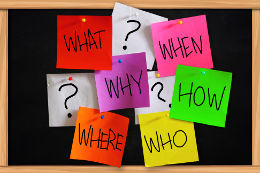
- Read the topic carefully, slowly and at least twice to absorb every information/detail.
- Underline/highlight/jot down any piece of information that you are expected to reuse:
- What type of text do you need to write? (a journal entry? A formal letter? A speech? Etc). Note to VCE French exam students : refer to page 13 of the VCE French Study Design for more information about the different types of texts.
- Who are you in the situation? (yourself? A journalist? etc)
- Who are you addressing? (a friend? A large audience? Etc) à adjust the degree of formality to the situation (for example by using the “tu”/”vous” form, a casual or formal tone/register, etc)
- What are the characteristic features of the type of text you need to write? (eg a journal entry will have the date, a formal letter will start and end with a formal greeting, etc)
- What is your goal ? What are you expected to talk about / present / defend / convey?
- What are the length requirements for your French essay ? Respect the word count (there’s usually a 5% or so tolerance. Check the requirements specific to your exam)
Tip : when you practice at home, count how many words in average you fit on a line. This will give you a good indication of how many lines your text should be.
Ex: You write an average of 15 words per line. If you are required to write a 300-word French essay, you should aim for:
300 words / 15 words per line = 20 lines total.
2. Draft the outline of your essay
- An essay typically has an introduction, a body with 2 or 3 distinct parts and a conclusion . (See if that outline is relevant to the type of text you are expected to write and adjust accordingly.)
- Use bullet points to organize your ideas.
- Don’t remain too general. A good rule is to use one main idea for each part and to back it up/reinforce in/illustrate it with one concrete example (eg. data).
- Brainstorming about things to say will also help you use a wider range of vocabulary , which will get noticed by the examiner. Are there some interesting/specific words or expressions that you can think of using in your text (example: if you are writing about global warming, brainstorm the vocab related to this topic. Brainstorm expressions to convince or disagree with something, etc)?
- Make sure you have reused every point identified in part 1 .
3. Write your essay
- It’s better if you have time to write or at least draft a few sentences on your draft paper rather than writing directly because:
- You want to meet the word count requirements
- You don’t want multiple words to be barred cross crossed-out and your page looking messy and great anything but neat!
- you don’t want to have to rush so much that your handwriting is really unpleasant to read (or worse, impossible to read…)
- So… monitor your time carefully!
Structuring your text
- Visually, the eye should instantly be able to see the structure of your French essay: make paragraph and skip lines so that it doesn’t look like an unappealing large block of text.
- Use connectors/link words to structure your text and make good transitions.
4. Proofread, proofread, proofread!
- It’s important that you allow at least 10 minutes for proofreading because there most likely are a few mistakes that you can fix very easily. It would therefore be a shame not to give yourself your best chances of success! Check out my Proofreading Checklist.
Bonne chance!
If you need any help with your essay, you can submit it to me there.
- Articles & Tutorials
- French Voices Podcast
- French Your Way Podcast
- News & Updates
info (at) frenchyourway.com.au
PO Box 166, Balaclava, Vic 3183, Australia
Learn How to Write in French Easily
- Everything About
- The alphabet
- Funny phrases
- Common words
- Untranslateable Words
- Reading Hacks
- Writing Tips
- Pronunciation
- Telling time
- Learn FASTER
- More resources
By OptiLingo • 9 minute read
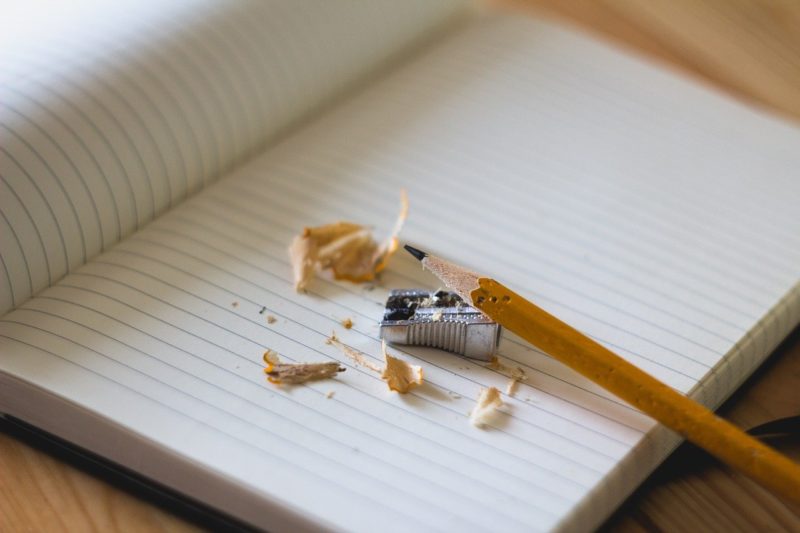
Improve Your Written French Today
Whether you want to pen a love letter or submit an essay in France, you need to know how to write in French. Luckily, learning how to write in French is fairly straightforward. Since French uses the Latin Alphabet, you’re already ahead of the game. Improve your writing in French fast with these easy steps.
The Basics of French Writing for Beginners
When it comes to French writing, it’s a little different than speaking French. But, if you know how to read French well, you shouldn’t have a lot of problems.
Before you read the 8 easy steps of learning to write in French, there’s one important factor in mastering French writing: practice. The only way you can truly improve your French writing skills is with a lot of practice . Make sure you write a little bit in French every day. Soon, you’ll find that writing in French is like second nature.
1. Watch Out for French Spelling
One of the biggest obstacles that throws French learners off is spelling. Unfortunately, those silent letters that you don’t pronounce are very much there in writing. Be careful how you spell certain complicated words. You need to master all parts of French grammar to write French correctly.

2. Genders Influence Grammar in French
You may already know that nouns have genders in French. They can either be masculine or feminine. And depending on the gender, different parts of a French sentence need to be conjugated.
- articles : French articles need to be conjugated to reflect the gender and the number of the noun. These can be ‘le’, ‘la’, ‘l”, and ‘les’ for definite articles, and ‘un’ and ‘une’ for indefinite articles.
- pronouns : Pronouns in French are the words that replace the name of the subject in a sentence. ‘He’, ‘she’, and ‘them’ are some examples of pronouns in English. In French, you need to use different forms of pronouns depending on the gender of the subject.
- adjectives : When you’re describing a noun, you use an adjective. And since the noun is the only reason the adjective’s there in the sentence, you need to make the adjective fit the noun in French. There are various ways to conjugate French adjectives depending on the gender and the number of the noun, so make sure you brush up on that knowledge before you write in French.

3. Careful with French Accent Marks
French accent marks also don’t do us any favors. While they’re extremely useful when it comes to French pronunciation, their writing isn’t as straightforward. Try to associate the sound with the written French word. There are only 5 accent marks in French. One is the cedilla (ç), which only works with the letter “c”, and another is the acute accent (é), which only sits on top of the letter “e”. So in practice, there are only 3 different kinds of accents you should look out for in French.
4. Follow the French Sentence Structures
English and French sentence structures are similar in many ways. Both follow the SVO (subject-verb-object) structure, which makes writing in French much easier. And just like in English, the French sentence structure is also flexible. You can switch the words around to emphasize a part of a sentence, but still have the same meaning.
- Tomorrow , I’m going to work. Demain je vais travailler. I’m going to work tomorrow . Je vais travailler demain .
The most important part of the first sentence is the time the speaker goes to work. The second sentence focuses on the subject, the speaker instead. Still, both sentences convey the same meaning of going to work.
If you want to ask a question in French, you can do so by putting a question word at the beginning of the sentence. Common question words are:
- How Comment
- What Que / Qu’est-ce que queue
- What kind Quel genre
- When Quand
- Why Pourquoi
You can also ask a question by switching the order of the verb and the pronoun around, and connecting them with a hyphen:
- Do you speak English? Parlez-vous anglais ?
It’s important to remember these basic rules of French sentence structure before you start writing in French. If you want to learn how to write in French effectively, practice these 4 steps a lot.

Psst! Did you know we have a language learning app?
- It teaches you useful words and phrases.
- Presented in a natural, everyday context.
- Spaced out over time, so you absorb your new language organically.
- It’s kind of like learning the words to your new favorite song!
You’re only one click away!
How to Write in French for Intermediate Students
If you’re an intermediate French learner you’re familiar with basic French grammar, and you’re confident in writing in French. But, there’s always room to improve. Once you know the basic steps of how to write in French, it’s time to make your writing even better. You can start paying attention to style, flow, and structure. The tips below will benefit your French writing practice.
5. Try Nominalization
This useful technique will make your sentences better. Nominalization means that you make nouns in the sentence more dominant. While in English, the dominant words are verbs, in French, you can write with the focus of the noun instead, making them more meaningful. Here’s an example to demonstrate.
- Normal sentence: The ice cream is cold. – La glace est froide.
- Nominalized sentence: The ice cream is cold. – La glace, c’est droid.
6. Use French Conjunctions
Conjunctions are the tools to write complex French sentences. Without them, you’re limited to simple and boring sentence structures. As an intermediate student, you can start connecting two equal or unequal sentences to make an even more interesting phrase. Here are the different kinds of French conjunctions you can use to write better in French:
Coordinating Conjunctions:
You use these kinds of conjunctions to connect two equal sentences. The most common coordinating conjunctions in French are:
Subordinating Conjunctions:
If one of the sentences in unequal or dependent on the other, you need to use subordinating conjunctions. These connectors often show causality. The most common conjunctions in French for this category are:
7. Style and Flow
Now that you wield the power of conjunctions, you have to be careful with it. As fun as it is to write long and complicated sentences in French, it doesn’t sound good. Make sure you use appropriate sentence lengths as you’re writing in French.
Aim for shorter sentences. Make them explain your point well. But, feel free to mix the flow up with the occasional longer sentences. That’s how you write in French with a nice and smooth flow. And that’s how you perfect your French writing too. It will be a pleasure to read your work.
Writing in French for Advanced Learners
Once you mastered all of the French writing rules, you’re officially an advanced French learner. But, there may still be room to improve your French writing. If you’re looking to kick your projects up a notch, you can learn how to write essays and dissertations in French. These pointers will be useful if you ever attend school or university in France, or you want to take a language exam.
8. Get Familiar with French Essay Structure
When you’re writing an essay, you have to structure it for readability. If you want to learn how French high schoolers are taught to write their essays, this is the structure they follow: thèse-antithèse-synthèse (thesis-antithesis-synthesis). Learn how to write French essays using a traditional French essay structure.
- Introduction : You begin your essay by having an introduction, which is a context for argument.
- Thesis : In this section, you present and defend the statement of your thesis. You need to write everything that supports the topic of your essay.
- Antithesis : The antithesis follows the thesis. This is where you state conflicting evidence and explain other potential substitutes for your essay. Including an antithesis doesn’t mean that you disagree with your original thesis. You just need to show that you thought of all possibilities before arriving to your conclusion.
- Synthesis : This is your conclusion. This is where you summarize your arguments, and explain why you still stand by your original thesis despite the antithesis.

9. Use Introduction and Conclusion Vocabulary
Certain words can encourage sentence flow by introducing or concluding some parts of your work.
- tout d’abord (firstly)
- premièrement (firstly)
- deuxièmement (secondly)
- ensuite (then)
- enfin (finally)
- finalement (finally)
- pour conclure (to conclude)
You can use these words when introducing a new idea to your dissertation or essay. These words will signal the readers that they are encountering a new part or thought of your writing process.
10. Writing a Dissertation in French
This is the form of writing you encounter in French higher education. It’s a very complex form of French writing, only the most advanced and fluent French learners should attempt it. It’s also a longer piece of academic writing. It may take you weeks to complete research and write your French dissertation.
The French dissertation is similar to essay structure. But, there’s one main difference: your thesis isn’t a statement, but rather a question. It’s your job in the dissertation to take the reader through your thought process and research to answer your question. This logic is known as “ Cartesian logic .” It comes from Descartes , who was a well known French philosopher.
History of Written French
French was used in Strasbourg Oaths, and it first appeared in writing in 842 AD. Before then, Latin was the only language used for literature in Europe. However, in the 10th and 11th centuries, French appeared in some religious writings and documents but was not used up to the late 12th century or early 13th century. The first greatest French Literature work, the Song of Roland (Chanson de Roland), was published around the year 1200.
Writing in French Alone Won’t Make You Fluent
You need to learn how to write in French to be proficient in the language. But, it won’t make you fluent. The only way to become fluent is to practice speaking French. While it’s crucial to develop every area of your French knowledge, if you want to be fluent in French, you need a reliable language learning method like OptiLingo.
OptiLingo is an app that gets you speaking, not typing a language. It gives you the most common French words and phrases, so you’re guaranteed to learn the most useful vocabulary. Don’t waste time trying to learn French you’ll never use. Complement your French writing practice with fun speaking exercises when you download OptiLingo !
Related posts

What You Should Know About French Business Relationships

French Alphabet 101

Everything to Know About French Grammar

Forming Friendships in France
Many people believe they aren’t capable of learning a language. we believe that if you already know one language, there’s no reason you can’t learn another..

Like puzzles? Check out this daily anagram game: Raganam !
- Your Favourite Cheat Sheets
- Your Messages
- Your Badges
- Your Friends
- Your Comments
- View Profile
- Edit Profile
- Change Password
- New Cheat Sheet
- Live Cheat Sheets
- Draft Cheat Sheets
- Collaborations
- Cheat Sheet Downloads
- Download This Cheat Sheet (PDF)
- Rating: ( )
- Education >
- French Cheat Sheets
Writing essays in French Cheat Sheet by JAM
Useful expressions to help structure your A level French essay.
Introducing the first argument
Adding and listing arguments, listing arguments - start, listing arguments - middle, listing arguments - end.
You are using an outdated browser. Upgrade your browser today or install Google Chrome Frame to better experience this site.
- French »
- French Language Learning Library »
French Writing Practice
French writing exercises by level.
Practise your French writing skills with our ever-growing collection of interactive French writing exercises for every CEFR level from A0 to C1! If you're unsure about your current proficiency, try our test to get your French level before diving into the exercises.
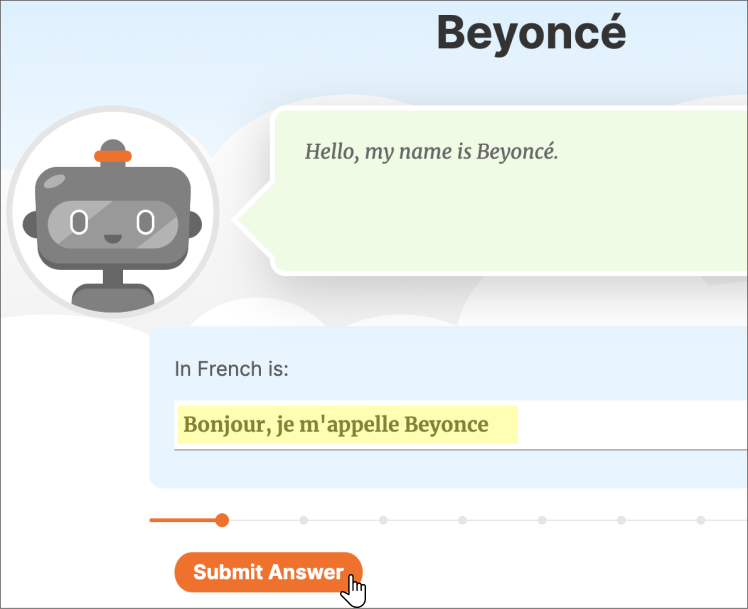
All writing exercises are made by our qualified native French teachers to help you improve your writing skills and confidence.
Kwizbot will give you a series of prompts to translate to French. He’ll show you where you make mistakes as you go along and will suggest related lessons for you.
Boost your French writing skills by adding the lessons you find most interesting to your Notebook and practising them later.
Click on any exercise to get started.
A1: Beginner French writing exercises
- A Christmas feast Celebrations & Important Dates Food & Drink Adjectif Adjectif démonstratif Adjectif possessif Sébastien is in charge of Christmas Eve Dinner this year.
- A French lunch menu Food & Drink Monuments, Tourism & Vacations Adjectif Adjectif possessif Article Here's the typical lunch menu of a French coffee shop.
- A French woman Employment Adjectif Adjectif possessif Adverbe Élodie tells us about her everyday life as a lawyer specialising in women's rights.
- A day in my cat Max's life Family & Relationships Adjectif possessif Article Article contracté Juliette tells about her cat's daily routine.
- A day in the city of Le Mans Monuments, Tourism & Vacations Adjectif Adjectif possessif Adverbe Audrey had a nice time visiting Le Mans, in northwestern France.
- A dream Family & Relationships Adjectif Adjectif possessif Article Geoffrey tells us about one of his dreams.
- A love story Family & Relationships Adjectif Adjectif possessif Adverbe Cécile and Andrew meet in a bar.
- A rainy afternoon Family & Relationships Adjectif Adjectif possessif Adverbe Soizic and Armelle meet up on a rainy day in Brest.
- A romantic Valentine Celebrations & Important Dates Family & Relationships Adjectif démonstratif Adjectif possessif Adverbe Henri tells us about his special plans for Valentine's Day.
- A winter meal Food & Drink Accord Adjectif Adjectif possessif Bernard has his perfect comfort meal for cold nights.
- Actress Anne Dorval Famous People Film & TV Adjectif Adjectif indéfini Adjectif possessif Claire tells us about her favourite actress, French-Canadian Anne Dorval.
- Anne's Easter loot Celebrations & Important Dates Accord Adjectif Adjectif possessif Anne lists all the treats she found during her Easter egg hunt.
- Annoying Things Family & Relationships Adjectif Adverbe Article Philippe and Julien share some of the things that really annoy them.
- Arnaud and Ophélie describe themselves Family & Relationships Accord Adjectif Adjectif possessif Arnaud and Ophélie describe themselves physically.
- At midnight Celebrations & Important Dates Family & Relationships Food & Drink Adjectif indéfini Adjectif possessif Adverbe Sébastien's family celebrates Christmas on the evening of the 24th.
- At the beach Free Food & Drink Sports & Leisure Adjectif Article Article défini Conversation at the beach between an ice cream vendor and a customer.
- At the beach Monuments, Tourism & Vacations Adjectif Adjectif possessif Article Tom is telling us about his day at the beach.
- At the bookshop Employment Literature, Poetry, Theatre Adjectif Adjectif possessif Adverbe François needs help choosing a book.
- At the gift shop Monuments, Tourism & Vacations Adjectif Adjectif démonstratif Adjectif possessif Mike and Linda pick some souvenirs in a Montmartre gift shop.
- At the newsagent's Employment Family & Relationships Adjectif Adverbe Article Sophie is buying a few items at a French newsagent's.
- At the sporting goods store Sports & Leisure Accord Adjectif Adjectif démonstratif Alain is buying tennis equipment for his son.
- Baby at the beach Family & Relationships Accord Adjectif Adjectif possessif Baby enjoys being at the beach with his family.
- Back to School Family & Relationships Language & Education Accord Adjectif Adjectif possessif Mathieu tells us about going back to school tomorrow.
- Ball Sports Sports & Leisure Adjectif Adjectif possessif Article Vincent and Leila discuss their favourite ball sports.
- Beyoncé Family & Relationships Famous People Music Adjectif Adjectif possessif Adverbe The famous singer introduces herself.
- Board games Family & Relationships Sports & Leisure Adjectif Adjectif possessif Adverbe Jonathan is playing board games with his family.
- Booking a hotel room Monuments, Tourism & Vacations Adjectif Adjectif possessif Article Pierre wants to book a room in a hotel.
- Can I come? Family & Relationships Sports & Leisure Adjectif Adjectif possessif Article Marie chats with her roommate's friend Damien.
- Cleaning with my family Family & Relationships Adjectif démonstratif Adjectif indéfini Adjectif possessif Jonathan and his family are cleaning the house today!
- Corsica is beautiful! Monuments, Tourism & Vacations Adjectif Adjectif possessif Article Julien explains why he thinks Corsica is so beautiful.
- Do you like the French language? Language & Education Adjectif Adjectif démonstratif Adjectif indéfini Noémie and Léo have opposite opinions on the French language!
- Do you like theme parks? Sports & Leisure Adjectif Adjectif indéfini Adverbe Louis and Zoé give their opposite opinions on theme parks.
- Driving in the city Family & Relationships Sports & Leisure Adjectif Adverbe Forme négative Sophie and Christophe talk about driving in city centres [US: downtown].
- Easter decorations Free Celebrations & Important Dates Family & Relationships Sports & Leisure Accord Adjectif Adjectif démonstratif Alice and her sister Zoé are decorating their house for Easter.
- Easter preparations Celebrations & Important Dates Language & Education Adjectif Adjectif indéfini Adjectif possessif Today, Daniel and his pupils are getting ready for Easter.
- Exchanging a scarf Family & Relationships Adjectif Adjectif démonstratif Article Christine is returning a scarf to the shop
- Father of two Family & Relationships Adjectif Adjectif possessif Article Léon talks about his two beloved children.
- Filling in a form Employment Family & Relationships Adjectif Adjectif possessif Article Olivier answers questions from a form.
- Food shopping for a picnic Food & Drink Adjectif Adjectif possessif Adverbe Daniel and Aline are buying food for a picnic.
- Gardening with Jacqueline Family & Relationships Sports & Leisure Adjectif Adjectif possessif Article Julia always loves to take care of her aunt's garden with her.
- Going on a diet Family & Relationships Food & Drink Sports & Leisure Adjectif Adjectif démonstratif Adjectif indéfini Marie has a plan to lose weight this year.
- Going shopping Family & Relationships Food & Drink Accord Adjectif Adjectif démonstratif Annie and Nicolas discuss her upcoming trip to the shop.
- Hanukkah with my family Celebrations & Important Dates Family & Relationships Adjectif Adjectif démonstratif Adjectif indéfini Rachelle celebrates Hanukkah with her family every year.
- Hello! I'm Mario! Famous People Sports & Leisure Accord Adjectif Adjectif possessif The famous plumber introduces himself.
- Hello, my name is France! Politics, History & Economics Accord Adjectif Adjectif possessif The country France introduces itself.
- Helping my neighbourhood Family & Relationships Adjectif possessif Adverbe Article Noémie likes helping her neighbours after school.
- Helping the planet Technology & Science Adjectif Adjectif possessif Adverbe François does his best to help the planet in his everyday life.
- How to stay healthy Food & Drink Sports & Leisure Accord Adjectif Adjectif possessif Matthieu tells us about his healthy habits.
- How to vote at a polling station in France? Politics, History & Economics Adjectif Adjectif possessif Adverbe Learn how to vote in a French election.
- I hate the rain! Sports & Leisure Adverbe Article défini Article indéfini Annie stays in on rainy days
- Load more …
A2: Lower Intermediate French writing exercises
- A Creole picnic Food & Drink Monuments, Tourism & Vacations Accord Adjectif Adjectif possessif During a visit to La Réunion, Julie and Léo went for a typical Creole meal.
- A family of dog lovers Family & Relationships Adjectif Adjectif possessif Adverbe Anthony had many dogs growing up, but Pip was special.
- A few days in Dordogne Free Monuments, Tourism & Vacations Adjectif Adjectif indéfini Adjectif possessif Monique tells Patrick about her coming holiday [US: vacation].
- A football accident Family & Relationships Sports & Leisure Adjectif Adjectif possessif Adverbe Anthony had his friend Bruno over to play...
- A great party for Mum [US:Mom]! Celebrations & Important Dates Family & Relationships Adjectif Adjectif indéfini Adjectif possessif Manon and her sister Aline treated their mother for Mother's Day.
- A nice train journey Family & Relationships Monuments, Tourism & Vacations Adjectif Adjectif possessif Adverbe Lucie and her boyfriend Marc went to the countryside by train this weekend.
- A noisy hotel room Monuments, Tourism & Vacations Adjectif Adjectif possessif Adverbe Bertrand complains to the hotel reception about noises during the night.
- A romantic trip to Paris Family & Relationships Monuments, Tourism & Vacations Adjectif Adjectif démonstratif Adjectif indéfini Anna took her boyfriend on a romantic trip to Paris.
- A romantic weekend away Family & Relationships Sports & Leisure Adjectif indéfini Adjectif possessif Adverbe Aline and her boyfriend went away for a relaxing weekend.
- Afternoon ice cream Free Food & Drink Adjectif Adjectif démonstratif Adjectif possessif Lucie and Greg feel like an ice cream this afternoon.
- An Easter egg hunt Celebrations & Important Dates Accord Adjectif Adjectif possessif Discover where Julien and his siblings found their Easter eggs!
- Arriving at the hotel Employment Monuments, Tourism & Vacations Adjectif Adjectif possessif Adverbe Aline checks into her Parisian hotel.
- At my best friend's wedding Family & Relationships Adjectif Adjectif démonstratif Adjectif indéfini Patrick gives a toast at Stéphane's wedding.
- At rapper Soprano's concert Music Adjectif Adjectif indéfini Adjectif possessif Romain was thrilled to finally see his idol Soprano live!
- At the Chinese restaurant Food & Drink Adjectif Adjectif possessif Article James is ordering food in a Chinese restaurant.
- At the New Year's Eve House Party Celebrations & Important Dates Accord Adjectif Adjectif indéfini Mathieu welcomes his guest at his New Year's Eve house party.
- At the allergist's Employment Technology & Science Accord Adjectif Adjectif démonstratif Pierre went to the allergist to get a diagnosis.
- At the bar Food & Drink Adjectif Adjectif démonstratif Adverbe Au bar Patricia and Samuel discuss what drinks they want to order.
- At the bureau de change Employment Monuments, Tourism & Vacations Adjectif Adjectif possessif Article Patrick needs to change some dollars upon arriving in Paris.
- At the dermatologist's Employment Technology & Science Accord Adjectif Adjectif indéfini Manon needs help with her eczema.
- At the farmers' market Food & Drink Sports & Leisure Adjectif Adjectif démonstratif Adjectif possessif Stéphane enjoys a visit to his local farmers' market.
- At the grocery store Employment Family & Relationships Food & Drink Accord Adjectif Adjectif démonstratif Julie and Frank need some things from the grocery store.
- At the medieval market in Orléans Art & Design Monuments, Tourism & Vacations Adjectif Adjectif démonstratif Adverbe Flora and Sami enjoy Orléans's medieval market.
- At the mountain restaurant Food & Drink Adjectif Adjectif démonstratif Adjectif possessif Gérard and Sylvie stop for lunch after their mountain hike.
- At the post office Family & Relationships Adjectif possessif Adverbe Article Christophe has a few errands to run at the post office.
- At the shoe store Family & Relationships Adjectif Adjectif démonstratif Adjectif possessif Christine is looking for a pair of shoes with the help of a nice sales assistant.
- Bastille Day in the South of France Celebrations & Important Dates Adjectif Adjectif indéfini Adverbe Bernard tells us about celebrating Bastille Day last summer.
- Bedtime stories Family & Relationships Literature, Poetry, Theatre Adjectif Adjectif indéfini Adjectif possessif Florian remembers the bedtime ritual he had with his daughter.
- Breakfast in the sun Family & Relationships Food & Drink Adjectif Adjectif démonstratif Adjectif indéfini Sabrina surprised Thomas with a nice breakfast on the balcony.
- Calling the hotel's room service Monuments, Tourism & Vacations Adjectif Adjectif possessif Adverbe Valérie calls room service from her hotel room.
- Chocolate mousse cooking tips! Food & Drink Adjectif Adjectif possessif Adverbe André gives us some tips to make the perfect chocolate mousse.
- Conversation on the plane Family & Relationships Monuments, Tourism & Vacations Adjectif Adjectif indéfini Adjectif possessif Pascal and Julie get acquainted on a flight to Montpellier.
- Cooking as a family Family & Relationships Food & Drink Accord Adjectif Adjectif démonstratif Yesterday, Antoine and his family made tartiflette together.
- Dividing the restaurant bill Food & Drink Monuments, Tourism & Vacations Sports & Leisure Adjectif possessif Adverbe Article Isabelle and her friends are splitting the bill at the restaurant.
- Do you have a favourite male singer? Famous People Music Adjectif Adjectif indéfini Adjectif possessif Simone and Amélie are talking about their favourite French-speaking male singers.
- Do you have any dirty clothes? Family & Relationships Adjectif Adjectif possessif Adverbe Bastien and his mother debate the need for a dirty laundry basket.
- Driving in France Monuments, Tourism & Vacations Technology & Science Adjectif Adjectif indéfini Adjectif possessif Here are a few things to be aware of when driving in France!
- Fireworks Celebrations & Important Dates Family & Relationships Sports & Leisure Accord Adjectif Adjectif indéfini Juliette went to watch New Year's fireworks yesterday.
- Fishing with Dad Sports & Leisure Adjectif Adjectif possessif Adverbe Benjamin went fishing with his father last Sunday.
- Getting to know each other Employment Family & Relationships Adjectif Adjectif possessif Adverbe New colleagues Julien and Olivier get to know each other over a coffee.
- Giving up tobacco Family & Relationships Adjectif Adjectif possessif Adverbe Amélie has stopped smoking and she's so happy about it!
- Holiday [US: Vacation] by the sea Family & Relationships Monuments, Tourism & Vacations Adjectif Adjectif démonstratif Adjectif indéfini Édouard remembers his childhood seaside holidays [US: vacations] in the south of France.
- I love autumn! Family & Relationships Food & Drink Sports & Leisure Accord Adjectif Adjectif indéfini Jacqueline tells us what she loves to do in the fall.
- I love my grandmother! Family & Relationships Adjectif Adjectif démonstratif Adjectif possessif Lucas tells us about his lovely grandmother.
- I prefer going skiing Sports & Leisure Adjectif Adjectif démonstratif Adjectif possessif Pierre tells us why he prefers going skiing rather than beach holidays.
- In a taxi Family & Relationships Article Article contracté Article partitif Magalie needs her taxi to take her for a few errands.
- In the changing rooms Family & Relationships Sports & Leisure Accord Adjectif Adjectif démonstratif Mélanie is trying on a dress... and testing Pierre's patience!
- Instagram love Family & Relationships Technology & Science Adjectif indéfini Adjectif possessif Adverbe Julien and Sandra became famous thanks to their Instagram account.
- Instructions for a test Language & Education Adjectif Adjectif indéfini Adjectif possessif Teacher Marc read out the instructions for today's French test.
- Jojo is such a joker! Family & Relationships Adjectif Adjectif indéfini Adjectif possessif Thomas talks about his school friend Jojo, who loves a joke.
B1: Intermediate French writing exercises
- A French April Fool's Celebrations & Important Dates Sports & Leisure Adjectif Adjectif démonstratif Adjectif possessif Cécile and her sons are making the traditional French fish for April Fool's day.
- A Horror Story Celebrations & Important Dates Family & Relationships Adjectif Adjectif possessif Adverbe On a dark October night, Emma received a disturbing call...
- A childhood passion Family & Relationships Sports & Leisure Adjectif Adjectif indéfini Adjectif possessif Vincent and his brother loved video games growing up.
- A clichéd break-up Family & Relationships Adjectif Adjectif indéfini Adjectif possessif François uses all the clichéd breakup lines to leave his girlfriend Sophie.
- A family day at the park Family & Relationships Food & Drink Sports & Leisure Adjectif Adjectif possessif Article Benoît will spend this Saturday at the park with his daughter Mia.
- A game of hide and seek Family & Relationships Adjectif Adjectif démonstratif Article Linda and Christian are watching from afar a game of hide and seek between the children.
- A good work routine Employment Adjectif Adjectif démonstratif Adjectif indéfini Marc plans to improve his work routine.
- A greener future Technology & Science Adjectif Adjectif possessif Adverbe Julien is seeing a future where people are more eco-conscious.
- A special Monday Celebrations & Important Dates Family & Relationships Sports & Leisure Adjectif indéfini Adjectif possessif Adverbe Anna is looking forward to a lazy Easter Monday!
- A strange encounter Family & Relationships Literature, Poetry, Theatre Adjectif Adjectif indéfini Adjectif possessif Yoann had the strangest encounter in the Broceliande forest!
- A trip to the cinema Film & TV Sports & Leisure Adjectif Adjectif possessif Adverbe Antoine and his daughter Emma are planning a trip to the movies.
- A weather forecast Technology & Science Adjectif Adverbe Article Find out what tomorrow's weather will be like.
- A weekend in Montpellier Monuments, Tourism & Vacations Adjectif Adjectif possessif Adverbe Élise and Lucas plan their weekend in the southern French city.
- An amazing New Year's Eve meal Celebrations & Important Dates Food & Drink Accord Adjectif Adjectif possessif Henriette is planning a dazzling meal for New Year!
- An annoying cat allergy Family & Relationships Adjectif Adjectif indéfini Adjectif possessif Éloïse suffers from an annoying cat allergy.
- An incredibly caring boy Family & Relationships Adjectif Adjectif démonstratif Adjectif indéfini Lydia's son, Olivier, is such a caring person.
- An old scary tradition Celebrations & Important Dates Monuments, Tourism & Vacations Adjectif Adjectif démonstratif Adjectif indéfini Yoann recalls celebrating the old Celtic tradition of Samhain with his Gran.
- Animal emergency Family & Relationships Adjectif Adjectif démonstratif Adjectif possessif Julien's cat is stuck in the tree!
- Around the world by motorcycle Monuments, Tourism & Vacations Sports & Leisure Adjectif Adjectif démonstratif Adjectif indéfini Joël would love to travel the world on his motorcycle.
- Artist Chéri Chérin Art & Design Famous People Adjectif Adjectif possessif Adverbe Learn about the amazing Congolese artist Chéri Chérin.
- Asking about a hotel room Monuments, Tourism & Vacations Adjectif Adjectif indéfini Adjectif possessif Catherine has a few questions about the hotel room she's booked.
- At the amusement park Sports & Leisure Adjectif démonstratif Adjectif indéfini Adjectif possessif Thomas will go to the amusement park with his friend Samia for their birthday this year.
- At the doctor's Family & Relationships Adjectif Adjectif possessif Adverbe Robert goes to the doctor for a consultation.
- At the till Employment Sports & Leisure Adjectif Adjectif démonstratif Adjectif indéfini Peter is at the till [US: cash register] of a French supermarket.
- Becoming a model Art & Design Employment Adjectif Adjectif démonstratif Adjectif indéfini Enjoy some useful tips on becoming a model.
- Birthday makeover Family & Relationships Accord Adjectif Adjectif indéfini "New year, new me" Julia thought on her 20th birthday.
- Busy Schedule Family & Relationships Adjectif démonstratif Adjectif possessif Adverbe Isabelle recaps what everyone will have to do on Saturday!
- Camping at home Monuments, Tourism & Vacations Sports & Leisure Adjectif Adjectif démonstratif Adjectif indéfini Gabriel and Rose are making plans for the weekend.
- Cathy's future holiday [US: vacation] in Montpellier Free Monuments, Tourism & Vacations Adjectif Adjectif démonstratif Adjectif indéfini Learn about Cathy's plan to spend her holiday [US: vacation] in Montpellier.
- Christmas in the mountains Celebrations & Important Dates Family & Relationships Monuments, Tourism & Vacations Adjectif Adjectif indéfini Adjectif possessif Antoine will spend Christmas at his dad's house in the Alps, if he can get there!
- Christmas specialities Celebrations & Important Dates Food & Drink Adjectif Adjectif indéfini Adjectif possessif Paul tells us about some traditional French Christmas dishes.
- Conversation between the election's two rounds Politics, History & Economics Adjectif Adjectif démonstratif Adjectif indéfini Marc explains the French presidential election process to his friend Alice.
- Corsican polyphonic singing Monuments, Tourism & Vacations Music Adjectif Adjectif démonstratif Adjectif indéfini Do you know about this bewitchingly melodic tradition from Corsica?
- Cycling in Nantes Monuments, Tourism & Vacations Sports & Leisure Accord Adjectif Adjectif indéfini Isabelle agrees with Nantes's status as France's "cycling capital".
- Dalida Famous People Music Adjectif Adjectif possessif Adverbe Learn about Dalida, an iconic French-speaking singer.
- Dealing with your emotions Sports & Leisure Technology & Science Adjectif Adjectif possessif Adverbe Here's a guide to keeping calm.
- Discussing a ski weekend Sports & Leisure Accord Adjectif Adjectif démonstratif Laurent and his friend Matt are planning their ski weekend.
- Dreaming of Paris Family & Relationships Monuments, Tourism & Vacations Adjectif Adjectif démonstratif Adjectif possessif Grégory imagines his ideal Valentine's Day's proposal.
- Easter baking class Celebrations & Important Dates Food & Drink Accord Adjectif Adjectif possessif Flora and Yvan enjoy decorating their Easter chocolate bunnies.
- Family holiday car trip Family & Relationships Monuments, Tourism & Vacations Adjectif possessif Adverbe Concordance des Temps Let the squabbles begin!
- Flying anxiety Family & Relationships Monuments, Tourism & Vacations Adjectif Adjectif démonstratif Adjectif indéfini Jean-Luc has a plan to deal with his fear of flying.
- Following the GPS Monuments, Tourism & Vacations Technology & Science Adjectif démonstratif Adjectif indéfini Adjectif possessif Follow this GPS's instructions to reach your destination.
- Getting ready for autumn Celebrations & Important Dates Family & Relationships Sports & Leisure Adjectif démonstratif Adjectif possessif Article Rosalie won't get caught out by the arrival of autumn this year.
- Giving up smoking Family & Relationships Adjectif Adjectif possessif Adverbe François tells us how he managed to stop smoking.
- Going back in time Family & Relationships Politics, History & Economics Adjectif Adjectif démonstratif Adverbe Marine asks Amanda, Bruno and Sébastien what they would do if they could go back in time.
- Going to the bank Family & Relationships Adjectif Adjectif possessif Article Flora and her father need to go to the bank.
- How to share household chores equally Family & Relationships Accord Adjectif Adjectif démonstratif Follow Céline's tips to share household chores more equally.
- I love swimming! Sports & Leisure Adjectif Adjectif démonstratif Adjectif possessif Thomas tells us about his love for swimming and his hope to one day dive from up high!
- I miss French food! Food & Drink Adjectif Adjectif indéfini Adverbe Hélène tells Betty how she's coping with missing French food abroad.
- I want to help! Family & Relationships Adjectif possessif Adverbe Article Suzanne wishes she had more time to help others.
B2: Upper Intermediate French writing exercises
- "Amélie": my favourite film! Film & TV Adjectif Adjectif démonstratif Adjectif possessif Lisa explains why "Amélie" is her favourite film.
- A History of French TV Film & TV Adjectif Adjectif démonstratif Adjectif possessif Learn some interesting facts about the beginnings of French TV.
- A busy weekend ahead Family & Relationships Adjectif indéfini Adjectif possessif Adverbe Olivier sums up his busy schedule for the weekend.
- A day in the countryside Free Family & Relationships Sports & Leisure Adjectif Adjectif possessif Adverbe Marie spent last weekend in the countryside with her daughters.
- A great Advent calendar Celebrations & Important Dates Sports & Leisure Adjectif Adjectif possessif Adverbe Find out how to make a unique Advent calendar.
- A great passion for reading Literature, Poetry, Theatre Sports & Leisure Adjectif Adjectif indéfini Adjectif possessif Florence talks about her grandmother's passion for books.
- A nice morning surprise Food & Drink Adjectif Adjectif démonstratif Adjectif indéfini Lucie will serve a delicious breakfast in bed to her fiancée on their anniversary.
- A nice table "à la française" Food & Drink Adjectif Adjectif possessif Article Jacqueline explains the intricacies of setting the table the French way.
- A nightmare journey Free Family & Relationships Adjectif indéfini Adjectif possessif Adverbe Josiane and Robert explain why they're an hour late to their friends' place.
- A perfect interview Employment Adjectif Adjectif démonstratif Adjectif indéfini Léo's just had the best job interview of his life!
- A slippery drive Technology & Science Adjectif Adjectif démonstratif Adjectif indéfini Richard struggled to get to work this morning: everything was frozen!
- At the football [US: soccer] game Celebrations & Important Dates Sports & Leisure Adjectif Adjectif démonstratif Adjectif indéfini Henri took his dad to a football [US:soccer] game for Father's Day.
- At the neighbours' house Family & Relationships Food & Drink Adjectif Adjectif démonstratif Adjectif possessif Véronique and Bruno are at their neighbours' house for an aperitif.
- Bad Movie Review Film & TV Adjectif Adjectif démonstratif Adjectif possessif Bernadette delivers a scathing movie review.
- Barbara Famous People Music Adjectif Adjectif indéfini Adjectif possessif Laëtitia talks about her passion for fascinating French singer Barbara.
- Bayonne, France's chocolate capital Food & Drink Monuments, Tourism & Vacations Adjectif Adjectif démonstratif Adjectif indéfini Learn why Bayonne is considered the French capital of chocolate.
- Brasserie La Coupole Food & Drink Monuments, Tourism & Vacations Accord Adjectif Adjectif indéfini Vincent always eats here when he's in Paris.
- British National Museums Monuments, Tourism & Vacations Adjectif Adjectif démonstratif Adjectif indéfini National museums are free in the UK, as Paul happily found out.
- Building a snowman Sports & Leisure Accord Adjectif Adjectif démonstratif Martine and Bastien enjoyed building a snowman.
- Camping with your dog Family & Relationships Sports & Leisure Adjectif Adjectif démonstratif Adjectif indéfini Patrick gives us some advice on taking your dog camping with you.
- Catherine Ségurane: a local heroine Famous People Monuments, Tourism & Vacations Politics, History & Economics Adjectif Adjectif indéfini Adjectif possessif Toni, a tourist guide from Nice talks about local legend Catherine Ségurane.
- City vs dog poop Family & Relationships Politics, History & Economics Adjectif Adjectif indéfini Adjectif possessif Alain and Pauline discuss the city's measures to fight against dog waste.
- Composting is awesome! Technology & Science Adjectif Adjectif démonstratif Adjectif possessif Elsa explains composting to her friend Pierre.
- Congratulations on your degree! Family & Relationships Language & Education Adjectif Adjectif démonstratif Adjectif indéfini Thomas's aunt and uncle send him an email to congratulate him on getting his Master degree.
- Conversation between friends Family & Relationships Sports & Leisure Adjectif Adjectif démonstratif Adjectif indéfini Friends Simon and Isabelle are catching up.
- Couples' annoying habits Family & Relationships Adjectif indéfini Adverbe Article Olivier gets so annoyed by the way couples behave sometimes!
- Easter, a family celebration Celebrations & Important Dates Family & Relationships Adjectif Adjectif démonstratif Adjectif indéfini François and his family celebrate the religious holiday of Easter.
- Family Reunion Family & Relationships Adjectif Adjectif démonstratif Adjectif indéfini At a family reunion, Lea sees her aunt Patricia for the first time in years.
- Finding the perfect anniversary gift Family & Relationships Adjectif Adjectif possessif Article Jean-Paul is listing his gift ideas for his wife on their anniversary.
- Food shopping in farm shops Food & Drink Politics, History & Economics Adjectif Adjectif démonstratif Adjectif indéfini Find out the advantages and disadvantages of food shopping in a farm shop.
- French Easter specialties Celebrations & Important Dates Accord Adjectif Adjectif démonstratif Discover some of France's regional Easter specialties.
- French-style lemon tart recipe Food & Drink Adjectif Adjectif démonstratif Adjectif possessif Follow the recipe to make a delicious lemon tart.
- Garip Ay's amazing paintings Art & Design Adjectif Adjectif démonstratif Adjectif possessif Jean-Pierre tells us about the work of this fascinating Turkish artist.
- Getting ready for the holiday [US: vacation] Monuments, Tourism & Vacations Adjectif Article Article contracté Bastien and Alicia are getting ready for tomorrow's departure.
- Giving back Celebrations & Important Dates Adjectif Adjectif démonstratif Adjectif indéfini Especially during the holiday season, it's good to give back to those less fortunate than us...
- Going lily-of-the-valley picking Family & Relationships Sports & Leisure Accord Adjectif Adjectif indéfini Jean-Pierre's family goes to pick lily-of-the-valley every year.
- Heatwave Politics, History & Economics Technology & Science Adjectif Adjectif démonstratif Adjectif indéfini A weather forecast on one of the hottest days of the year.
- High cost of cigarette packaging change Politics, History & Economics Adjectif Adjectif démonstratif Adjectif indéfini Learn about the cost of the new policy on cigarette packaging in France.
- I can't find my shirt! Family & Relationships Adjectif possessif Adverbe Article Claire and Julien are almost ready to go out...except for Julien's missing shirt!
- In a clothes store Sports & Leisure Adjectif démonstratif Adjectif indéfini Adjectif possessif Patrick complains to the sales assistant about a defective item.
- In the return taxi Monuments, Tourism & Vacations Adjectif Adjectif démonstratif Adjectif indéfini Aline talks about her trip with the taxi driver on her way back to the airport.
- Long time no see! Family & Relationships Adjectif Adjectif indéfini Adjectif possessif Marina and her cousin Tom catch up after quite a while.
- Louise Bourgeois Art & Design Famous People Politics, History & Economics Adjectif Adjectif démonstratif Adjectif indéfini Marie-Claire tells us about her favourite French artist.
- Mice invasion Family & Relationships Adjectif démonstratif Adjectif indéfini Adjectif possessif Lisa and Paul are discussing options to get rid of Lisa's mice.
- Moving house chores Family & Relationships Adjectif Adjectif démonstratif Adjectif indéfini Sophie had so many chores to do before moving into her new apartment.
- My car is a real beater! Sports & Leisure Technology & Science Adjectif Adjectif possessif Adverbe Yann's car has so many problems!
- My chosen family Family & Relationships Adjectif Adjectif indéfini Adjectif possessif Magalie found her own loving family.
- My dream invention Technology & Science Adjectif Adjectif démonstratif Adjectif indéfini Sonia asks Sylvie what invention she'd dream to see becoming a reality.
- My exotic Christmas Celebrations & Important Dates Monuments, Tourism & Vacations Adjectif Adjectif démonstratif Adjectif indéfini Aline is remembering spending last Christmas in Marrakech, Morocco.
- My first Easter memory Celebrations & Important Dates Family & Relationships Adjectif démonstratif Adjectif indéfini Adjectif possessif Alexandre remembers the first time he went egg hunting.
C1: Advanced French writing exercises
- 3 Culinary delights from French-speaking countries Food & Drink Monuments, Tourism & Vacations Adjectif Adjectif démonstratif Adjectif possessif Find out about three dishes from French-speaking countries.
- A bad matchmaker Family & Relationships Adjectif Adjectif indéfini Adjectif possessif Sophie tells us about her failed attempt at matchmaking.
- A couple's ups and downs Family & Relationships Adjectif Adjectif démonstratif Adjectif indéfini Hélène explains how she and her partner managed to navigate out of a rough patch.
- A difficult sibling relationship Family & Relationships Adjectif démonstratif Adjectif indéfini Adjectif possessif Yvan has always had a fraught relationship with his sister.
- A dreadful teenager Family & Relationships Adjectif Adjectif démonstratif Adjectif possessif Philippe recalls his bad behaviour as a teenage boy.
- A ghost story Celebrations & Important Dates Family & Relationships Adjectif Adjectif démonstratif Adjectif possessif Hugo is visiting his mother on All Saints' Day.
- A hard time at work Employment Adjectif indéfini Adjectif possessif Adverbe Érica went through a rough time at work.
- A horrible storm! Technology & Science Adjectif Adjectif démonstratif Adjectif indéfini Julien remembers spending a horrible night due to a violent storm.
- A last minute request Employment Family & Relationships Adjectif démonstratif Adjectif possessif Adverbe Isabelle's colleague keeps making her miserable...
- A long-standing friendship Family & Relationships Adjectif Adjectif démonstratif Adjectif indéfini Carole tells us about her long-standing relationship with her friend Aline.
- A lovely car Technology & Science Adjectif Adjectif démonstratif Adjectif indéfini Find out about Michel's beloved 2CV car.
- A lovely encounter Family & Relationships Sports & Leisure Adjectif Adjectif démonstratif Adjectif possessif On her daily walk, Audrey met a furry little friend in need of help...
- A special Christmas in Switzerland Celebrations & Important Dates Food & Drink Adjectif Adjectif démonstratif Adjectif indéfini Damien recalls a wonderful family Christmas holiday in Switzerland.
- A sudden reappearance Family & Relationships Adjectif démonstratif Adjectif indéfini Adjectif possessif After years of disappearance, Olivia's friend is back.
- Advice for new pet owners Family & Relationships Adjectif Adjectif indéfini Adjectif possessif Laurent asks people for their advice on welcoming a new pet at home.
- Alice and the Caterpillar (Alice in Wonderland) Literature, Poetry, Theatre Adjectif démonstratif Adjectif indéfini Adjectif possessif Alice meets the mysterious Caterpillar in this adapted excerpt from "Alice in Wonderland"
- An animal tale Family & Relationships Adjectif Adjectif démonstratif Adjectif indéfini By a lovely winter morning, Henri the hare meets poorly Lili the rabbit.
- An incredible trip on the Canal du Midi Monuments, Tourism & Vacations Sports & Leisure Adjectif Adjectif indéfini Adjectif possessif Patrice recalls his trip along the Canal du Midi.
- An upcycling tutorial Art & Design Sports & Leisure Technology & Science Adjectif Adjectif démonstratif Adjectif possessif Find out a few ideas for your upcycling projets.
- Anna's birthday party Family & Relationships Food & Drink Adjectif Adjectif indéfini Adjectif possessif Clément discusses the organisation of his daughter's birthday party with his friend Charlotte.
- At Uncle Robert's 70th birthday Family & Relationships Adjectif indéfini Adjectif possessif Adverbe Laura catches up with her cousin Charlotte at a family event.
- At the psychiatrist's Employment Family & Relationships Adjectif Adjectif démonstratif Adjectif indéfini Mme Dupont is talking to her psychiatrist.
- At the ski resort Sports & Leisure Adjectif démonstratif Adjectif indéfini Adjectif possessif Paul needs to get ski gear for himself and his family.
- Back to School shopping Family & Relationships Language & Education Accord Adjectif Adjectif démonstratif Viviane and Christian try and get everything on their children's school supply list.
- Bathroom chat Family & Relationships Accord Adjectif Adjectif démonstratif Bruno and Sonia are having a chat in the bathroom.
- Brest during World War II Politics, History & Economics Adjectif Adjectif démonstratif Adjectif possessif Alex is talking about WWII in Brest with his granddad.
- Californian dream Monuments, Tourism & Vacations Adjectif Adjectif démonstratif Adverbe Olivia finally followed her dream to move to California.
- Camping in the woods Free Monuments, Tourism & Vacations Adjectif Adjectif démonstratif Adjectif indéfini Nathalie enjoys camping in the middle of the woods.
- Coco Chanel Famous People Politics, History & Economics Adjectif Adjectif possessif Article Learn about this extraordinary woman who became a fashion icon.
- Complaining about a hotel room Monuments, Tourism & Vacations Adjectif démonstratif Adjectif indéfini Adjectif possessif Gérard complains to the receptionist about the state of his hotel room.
- Coping with the heatwave Family & Relationships Adjectif Adjectif possessif Adverbe Emma asks how Simon and his pregnant girlfriend Christelle coped with the extreme heat.
- Drôme provençale, a little piece of heaven Monuments, Tourism & Vacations Politics, History & Economics Accord Adjectif Adjectif démonstratif Vincent tells us about this beautiful region in the South of France.
- Engagement dinner's speech Family & Relationships Adjectif indéfini Adjectif possessif Adverbe The bride's father thanks the guests for attending and announces the evening programme.
- Engagement surprise Family & Relationships Adjectif Adjectif démonstratif Adjectif indéfini Louise enjoys an unexpected visit at her engagement party.
- Finding love at a yoga retreat Family & Relationships Sports & Leisure Adjectif Adjectif démonstratif Adjectif possessif Seniors Germaine and Pierrot didn't expect to fall in love at a yoga retreat.
- Fireside memories Family & Relationships Adjectif Adjectif démonstratif Adjectif indéfini Manuelle has warm memories of family times by the fireside.
- First day back to school Family & Relationships Food & Drink Adjectif Adjectif démonstratif Adjectif indéfini Sabrina tells us what she'll do on her children's first day back to school.
- French Mobile Phone Habits Politics, History & Economics Technology & Science Accord Adjectif Adjectif indéfini We're taking a look at the importance of mobile phones in French people's lives.
- Gardening weekend Sports & Leisure Adjectif Adjectif indéfini Adjectif possessif Jean-Pierre had a busy weekend taking care of his garden.
- Gastronomical review Food & Drink Adjectif Adjectif indéfini Adjectif possessif Discover a mouthwatering review of a French restaurant.
- Gluten-free living Food & Drink Adjectif Adjectif indéfini Adjectif possessif Alexandre tells us how he dealt with his newly discovered gluten allergy.
- Gustave Moreau Museum Art & Design Adjectif Adjectif démonstratif Adjectif possessif Claire tells us about her fascination for 19th-century symbolist painter Gustave Moreau.
- Holidaying in July Monuments, Tourism & Vacations Adjectif Adjectif démonstratif Adjectif indéfini July is a hard time to organise holiday [US: vacation] for, as Martine and Sam found out!
- How to show your love? Family & Relationships Adjectif Adjectif démonstratif Adjectif indéfini Marianne and her partner Adèle are making some changes to show their appreciation for each other more.
- In the lives of the writers of French romance novels Employment Literature, Poetry, Theatre Adjectif Adjectif démonstratif Adjectif possessif Discover what the life of a French writer of romance novels looks like.
- Jean-Marc Vallée Famous People Film & TV Adjectif Adjectif démonstratif Adjectif indéfini Nathan and Florence discuss the late Quebecois director Jean-Marc Vallée.
- Johnny Hallyday, a French icon Famous People Music Adjectif Adjectif démonstratif Adjectif indéfini Paul and his mum talk about her favourite French singer, Johnny Hallyday.
- La Petite France in Strasbourg Art & Design Monuments, Tourism & Vacations Adjectif Adjectif démonstratif Adjectif indéfini Discover this unique area of Strasbourg, a UNESCO site and tourists' favourite.
- Last-minute hesitations Family & Relationships Adjectif démonstratif Adjectif indéfini Adjectif possessif François is torn between his love for Marianne and his duty to the Duchess who he's about to marry.
- Letter to Santa Celebrations & Important Dates Adjectif Adjectif démonstratif Adjectif indéfini Timothée writes to Santa, hoping he's been good enough this year...
In this section
- Hanukkah 2023 Menorah
- Christmas 2023 Advent Calendar
- Tips and ideas to improve your French writing skills
- French Glossary and Jargon Buster

- TOP CATEGORIES
- AS and A Level
- University Degree
- International Baccalaureate
- Uncategorised
- 5 Star Essays
- Study Tools
- Study Guides
- Meet the Team
- Modern Foreign Languages
Mon College - My school French essay
Mon College
Je m'appelle Amy Vincent, j'ai 14 ans et je vais à Beal High School, à Ilford. Cependant, je n'habite pas dans Ilford, ma maison est à une demi-heure de l'ecole. Beal high school ètait un lycée de garçons seulement. Mon père jouerais le foot contre leur équipe de football. Pourtant maintenant l'école est mixte depuis 19 ans.

Mon école est un grand, en brique rouge bâtiment. Le terrain du sport est très grand tandis que le gymnase est de taille moyenne.
L'année dernière, j'ai dû choisir mes matières pour mes GCSEs. J'ai choisi le français, la musique, la technogie d'informations, les médias, et l'histoire. Je dois faire l'anglais, les maths et toutes les trois sciences; la physique, la biologie et la chimie. Malheureusement, mon professeur préféré ne m'enseigne plus. Il s'appelle Mr Larder et il rendre les cours drôle. Il était très drôle, faisait beaucoup de plaisanteries mais n'accepterait pas de bêtise des garçons.
This is a preview of the whole essay
Mon unforme d'école est honteux, même si la couleur de blazer changements de marron clair au marron sombre. Je dois porter une chemise blanche avec un signe dessus, qui est absurde car nous toujours doit porter notre blazer. Nous pouvons porter une jupe à plis ou droite. Personnellement, je préfère la jupe droite. J'aimerais pouvoir porter nos propres vêtements mais ce ne serait pas pratique car vous devriez toujours acheter nouvelles choses pour se maintenir avec la plus dernière mode.
A l'école, nous ne somme pas autorisés de mâcher du chewing gum mais quelquefois vous voyez les professeurs macher, qui est vraiment injuste. Je pense que les professeurs devraient suivre les mêmes règles que les élèves pour eviter des problèmes.
Après avoir terminé mes GCSEs, j'aimerais revenir faire des classes de premieres et terminale. Je pense que j'aimerais étudier la psychologie parce que l'esprit me fascine mais ça depends de mes résutats d'examen. Si je vais à l'université j'aimerais étudier pour être vétérinaire.

Document Details
- Word Count 342
- Page Count 1
- Subject Modern Foreign Languages
Related Essays

Mon college s'appelle Allerton High School.

Mon college - French coursework

Mon College Essay

French Coursework: Mon College, Work Experience
French Essay: Topics, Tips, and Examples [2024 Updated]
Nowadays, knowing several foreign languages is no longer surprising. For example, learning French is common for English-speaking countries. So, getting an assignment on this subject won’t be a surprise for a student.
Our specialists will write a custom essay specially for you!
Writing a French essay, you can dwell into:
- the history of the French language;
- various dialects;
- its grammatical features;
- similarities between French and English (or another language);
- the distribution of the language around the globe.
One studying the language may penetrate the rich French culture and comprehend the nation itself. Besides, writing a French essay can develop the author’s writing skills and broaden their outlook. And even if you make mistakes doing so, it’s not the end of the world. The fact that you’re able to recognize them is already good enough, and you can fix complex errors using a free essay rewriter .
Our writers prepared French essay topics and tips for you to nail your task. See the examples below for better understanding.
📯 French Essay Topics
Are you one of those who are assigned to write French essays? Then we suggest you pick out some of the following problems to investigate:
- History of the French language;
- Dialects of the French language;
- French phonology ;
- French orthography;
- French grammar ;
- French alphabet.
The suggested topics are too vague and need narrowing. You may single out some aspects and analyze it in your paper. An excellent French essay topic should be:
Just in 1 hour! We will write you a plagiarism-free paper in hardly more than 1 hour
- Broad for you to have enough room to develop your arguments;
- Narrow enough for you to be able to concentrate on one or several points;
- It should also be creative and original. You want people to enjoy reading it, right?
- Most importantly, the topic should be interesting for you.
If the essay topics seem too formal to you, study, for example, your progress in analyzing the French language. Alternatively, you can state what attracts you in the language and explain why. You may also do a comparative analysis of French and some other languages. Comparing French with English may turn out to be a fascinating task to cope with. Both languages will benefit from your French essay writing.
Here are some topics and French essay examples you can consider writing about:
- Your progress in learning the French language . Here you can write about your personal experience learning the French language. What techniques do you apply, and what motivates you personally? You can explain why you have to learn how to speak French.
- How are the French language and culture in Southern France different from Parisian? In this essay, you can compare the Southern French dialect and culture with the one in Paris. What are some of the critical phonetic, grammar, and linguistic characteristics of Southern French?
- Parisian dialect as a standard of French. When people think about the French language, the Parisian variant immediately comes to mind. In this essay, you can analyze why Parisian French became the standard version.
- Why do you enjoy learning French? This essay focuses on your personal preferences and likes in the process of learning. What makes it fun and enjoyable? Is it French movies, French literature, or understanding French written work documents?
- French influence on English . Although English is a Germanic language, it looks and sounds a lot like French. The influence which French had on English is significant. Look at some historical reasons (the Norman invasion in particular) and why English benefited from it.
- French language in 19th century Russia . Not everyone knows that French was the official language of the Russian elite in the 19th century. Discuss the reasons why and what influence French culture had on Russian literature, music, and language.
- The effect of the French language on the development of English writing . More than 10,000 French words came into the English language. Not only did the vocabulary of English get more prosperous, but the French way of spelling and letter convention influenced English orthography.
- What caused French to become an aristocratic language in Europe? The reasons why the French language became so dominant throughout Europe are broad. In this essay, you can focus on economic grounds, cultural or political reasons.
- An analysis of Canadian French. This essay can be a comparative analysis of Canadian and European French. What are the main differences? What are some similarities between the two variants?
- Is there any similarity between French and German ? All of the languages in the Indo-European language family have some similarities. Therefore, French and German are not exceptions. You can focus on sentence structure, word order, pronunciation, or phonetics.
- The popular strategies in English-French translation .
- Describe the challenges of French language acquisition.
- Analyze the peculiarities of French vowel pronunciation.
- Cultural events and their traditions in French-speaking countries .
- Discuss the advantages of learning French .
- Examine the semantic peculiarities of the French language.
- Explore the role of watching movies in the French language learning process.
- Comparison of language education theories .
- Analyze the impact of French language learning on your personality.
- Describe the methods you’ve used to improve your French language fluency and which turned out to be the most effective.
- Similarities and differences between realism and naturalism in Spanish and French literature .
- What is the role of the French language in the modern world?
- Advantages and disadvantages of knowledge of multiple languages .
- Discuss the role of the French language in the United States.
- The specifics of learning French in early childhood.
- Compare the grammar peculiarities of English and French languages.
- How is the concept of friendship interpreted in American and French cultures?
- Analyze the correlation between the history of France and French language development.
- Explore the origin of the French language.
- Verbal and non-verbal communication in French culture.
- Examine the crucial role of French literature in learning French.
- Describe the relationship between French culture and language.
- Is it a good idea to integrate bilingual programs in early childhood education?
- Discuss the best ways to prepare for the speaking exam in French.
- The role of audiovisual materials in learning French .
- What difficulties did you face when learning to write in French?
- The essential role of sociocultural context when translating from French.
- Compare the customs of French, Chinese, and Hispanic cultures.
- The best methods of learning the second language .
- Describe the best ways of promoting language development for French language learners.
- Analyze the methods of French word formation .
- Would you like to become a French language teacher?
- Analysis of the food words in English and other European languages.
- Examine the specifics of the French language in former French colonies .
Do not treat your French essay as an ordinary task to undertake. Make it as creative as possible!
🖋️ How to Write a French Essay
Note that writing on some language problems requires more than your knowledge of the subject matter. It also tests your abilities to present them in terms of academic writing.
Special care should be taken concerning the following:
Receive a plagiarism-free paper tailored to your instructions. Cut 20% off your first order!
- The structural organization of your French essay.
Mostly, it is similar to any other academic essay :
- It should start with a hook . In simple terms, it is the opening sentence or two of your writing. It can be a quote, a short story, or a catchy statement that grabs the reader’s attention.
Here’s an example of from the sample essay:
Every language is a mirror of society, a living organism that exists and changes under the influence of historical, political, and social conditions.
- The next part of your essay is a thesis statement . Typically, it should be placed at the end of the first paragraph. The thesis statement’s purpose is to state the central idea in one or two phrases.
Here is a thesis statement from our French essay example:
Today, it is common to study English as a foreign language, as an international means of communication. However, this does not diminish the importance of learning other foreign language like French.
- After that, the body of the essay should start. This part of the composition usually has three separate paragraphs. These paragraphs can include research, supporting evidence, and arguments that prove the point of view.
- The conclusion brings together all the points of the essay. It goes back to the thesis statement and explains the broader importance of the topic. It is the last chance to leave a lasting impression on the reader.
Here is an example form our French essay sample:
To conclude, the above discussion provides evidence and arguments that maintain the position according to which learning French is a necessity nowadays. The crucial points are as follows; first, French has a long tradition of international language; second, French is spoken around the globe; third, it is a language of international relationships. The opposing position that English is sufficient for appropriate global communication was claimed unreasonable – an emphasis in this regard was on the essence of cultural and language diversity.
- The logical organization of your French essay .
There are some ways in which you can coherently write your essay. The following three aspects can guide you when organizing your French essay:
Get an originally-written paper according to your instructions!
- Topic sentence : you should mind linking elements within the paragraphs and between them. First of all, each section should include a topic sentence. It aims to identify the central idea and express an overall direction in which the writer will develop the paragraph.
The demand for knowledge of a language has changed in recent years.
- Concluding sentence: each paragraph should also include a concluding sentence. It asserts the main idea of the section and sums up all the information said in it.
It may be claimed that in a period of rather an aggressive introduction of the Anglo-American language in the world, the French need to persistently and resolutely defend their language, their national interests, and calls on other nations to preserve linguistic diversity.
- Linking words: it is crucial to use linking words in your essay. Linking words show relationships between ideas. It can be used to build sentences together to develop a cohesive paragraph.
To see the full essay sample, check the link below:
- Grammar, spelling, and vocabulary.
The last step in writing an A+ French essay is proofreading and editing. Before submitting your academic paper, make sure to pay attention to grammar, spelling, and vocabulary mistakes . Without proofreading, your writing can contain typos and errors that will not leave a good impression.
Good luck with your French essay writing! We hope the article was helpful. If so, share it with your peers and leave a comment below to let us know what you think.
This might be interesting for you:
- How to Write an Expository Essay in Simple Steps
- Nursing Reflective Essay Example and Guidelines for Students
- Essay on Dengue Fever: How to Write + Free Examples
- Objective Essay Writing: How to Write, Topics and Examples
- Organizing an Essay: Jerry Plotnick, College Writing Centre, University of Toronto
- Organizing an Essay: Study Guide Zone
- Paragraphs & Topic Sentences: Writing Guides, Writing Tutorial Services, Indiana University Bloomington
- Thesis Generator: Ashford Writing Center
- Proofreading: The Writing Center, University of Wisconsin-Madison
- Basic Essay and Paragraph Format: Utah Valley University
- Share to Facebook
- Share to Twitter
- Share to LinkedIn
- Share to email

Dissertation critique writing develops the students’ critical and logical thinking abilities. When composing, the students learn to analyze the works conducted by other researchers. To critique a dissertation, you should: Thoroughly read the paper.Take notes and summarize the text (you can even try and use auto summarizer for that).Interpret and...

An opinion essay is a formal piece of writing which presents the author’s point of view on a particular subject supported by reasoning and examples. The opposing viewpoint is also suggested, but it is followed by arguments that show its inconsistency. Take a look at the guide prepared by Custom-writing experts to...

So, you need to accomplish your discursive essay writing. The typical questions most students ask are: How do you write it? What is discursive essay? A discursive essay is an academic paper that involves a discussion on a particular topic. It is usually assigned to college students. You may be...

How to write a narrative essay? To do that, you need to know what a narrative essay is. It is an academic text usually written as a story and containing all the usual elements of a story. Narrative essays are often personal, experiential, and creative. Still, they should be made...
![school essay in french Americanism Essay: Examples, Tips & Topics [2024 Update]](https://custom-writing.org/blog/wp-content/uploads/2020/12/american-flag-284x153.jpg)
It’s not hard to see why Americanism is one of the most popular essay topics. The concept of Americanism is in the center of the US identity. Writing an essay about it is an excellent way to find out more about this great country.

An art critique paper involves a comprehensive analysis and assessment of an artwork. Though this looks a bit complicated, the task doesn’t require a lot of time if you have sufficient critique writing skills. It’s an interesting assignment for students of art colleges as well as high schoolers. All you...

An article review is an academic assignment that invites you to study a piece of academic research closely. Then, you should present its summary and critically evaluate it using the knowledge you’ve gained in class and during your independent study. If you get such a task at college or university,...

Short essays answer a specific question on the subject. They usually are anywhere between 250 words and 750 words long. A paper with less than 250 words isn’t considered a finished text, so it doesn’t fall under the category of a short essay. Essays of such format are required for...

When you hear the phrase “spiritual leadership,” you probably think it’s only associated with religion. But did you know that this form of leadership can also be found in business? The book Spiritual Leadership: Moving People on to God’s Agenda by Henry and Richard Blackaby is a good starting point...

High school and college students often face challenges when crafting a compare-and-contrast essay. A well-written paper of this kind needs to be structured appropriately to earn you good grades. Knowing how to organize your ideas allows you to present your ideas in a coherent and logical manner This article by...

“If a tree falls in the forest, does it make a sound?” is one of the most debatable philosophical questions regarding observation and perception. Many tried to answer it, including the English philosopher John Locke. Do you need to explore Locke’s perspective on this question in your essay? You are on the right...

The long-standing debate surrounding abortion has many opponents and advocates. Groups known as Pro-Choice and Pro-Life argue which approach is better, with no easy solution in sight. This ethical complexity is what makes abortion a popular topic for argumentative writing. As a student, you need to tackle it appropriately. If...
It is not helpful to me.
Thanks for the help with out this i wouldn’t even know what to do on my essay
Hi, do you also do French powerpoint presentation?
Good advice. Thanks.
This was a very great help. I’m writing a French essay, and I know, thanks to your post and the provided tips on French essay writing, I will pass!
Hi! I just want to thank you for your ideas and tips for writing French essays! Write a French paper in English or write an essay for the French by an American) Funny.
Thanks a lot for the help.

No problem, Sash:) Good luck!
Que recherchez-vous ?
- Recognition of diplomas
- Language assistants in France
The most sought-after topics:
DELF Recognition of diplomas Language assistants in France
The French education system
- Copier le lien de partage
Read on this page
General overview of the french education system, the stages of the french education system, useful links, follow enic-naric france on social networks.
In France, education is mandatory and free from 3 to 16 years old. Access to higher education is dependent on achieving the baccalaureate national diploma.
The French education system is characterised by a strong State presence in the organisation and funding of education. On a national level, it is governed by the Ministry of National Education and the Ministry of Higher Education, Research and Innovation in a general framework set by the legislator, which, according to the Constitution, “lays down the basic principles of education” ( article 34 of the Constitution of 4 October 1958 ).
The official language in education is French. State education is free and secular. According to the French Education Code , education is mandatory for every child between the ages of 3 and 16 years.
Preschool education is provided in nurseries (pupils aged 3 to 6 years)

Attended by almost all children from the age of 3, preschools and primary schools comprise “primary” education. It falls under the responsibility of the Ministry of National Education.
Primary education is provided in primary schools (pupils aged 6 to 11 years)

Primary education lasts five years. At the end of primary education, pupils automatically progress to the next level of education (collège = lower secondary school).
Lower secondary education is provided in collèges (pupils aged 11 to 15 years)
Attending collège is mandatory for all pupils. At the end of this stage (classe de 3e = year 9), pupils are presented with the Diplôme national du brevet (DNB), which is an exam that does not influence admission to higher secondary education. Depending on the pupil’s academic record and future plans, they may be directed to a year 10 class (classe de 2e) in a general and technological or vocational lycée (upper secondary school) or the first year of the CAP vocational qualification.
Upper secondary education is provided in general and technological or vocational lycées (pupils aged 15 to 18 years)

This stage takes three years and includes three academic tracks: the general (which prepares pupils for a longer career in higher education), the technological (which prepares pupils for a shorter career in higher education with a technological focus) and the vocational (which mainly leads to employment, but also optionally to higher education).
Completion of upper secondary education is recognised with obtaining the national diploma: the baccalaureate. This provides access to higher education and constitutes the first university grade .
Higher education

In France, higher education is taught in institutes governed by a number of legal statutes, which are listed in the French Education Code . Consult the dedicated webpage for more information on higher education in France.
On this page, we'll look at some phrases for talking about school and education in French. This page assumes that you're also familiar with vocabulary for school subjects in French .
Names of school years
In the French educational system, names of school years "count down", whereas in the British and US systems, they generally "count up". This gives the following rough equivalents. Note that formally, the full name of French school years is classe de sixième (année) etc, but class de and année is usually omitted in everyday speech.
Classroom activities and instructions

The First Day of School
I guess I’ve never done a post that outlines what I do on the first day of school, so here it is. I’ve gotten my ideas from a variety of resources, so I will try to give credit where credit is due. First of all, I will say I got a lot of my ideas from this wonderful post from Creative Language Class, but I put my own spin on it.
I like students to walk away on the first day not only excited about the year ahead, but actually able to say a few words in the language they signed up for. By the end of this lesson, students will have learned the following words and expressions: Bonjour, Je m’appelle, Comment t’appelles-tu ?, and Au revoir ! Of course they will hear many other words and expressions along the way, but the aforementioned are the ones I am targeting.

I use a Prezi (see full Prezi at the bottom), and once class begins, I zoom in on this slide and announce my name to the class. Students shout out what they think it means.

Then I zoom into this slide (which I stole directly from Creative Language Class!), but I don’t say it out loud because I am speaking all in French.

Next, it’s time for attendance. I say “Ici,” and point to the floor, as in, right here, and then “Absent,” and put my hands in the air like I don’t know.
I then show this quick video to demo what attendance should look like. It’s a mashup of YakIt Kids (which sadly, is no longer available) and the animoji feature that you can get on newer iPhone models. Then I take attendance, and each student says, “Ici !”

Then I share a little about myself. I show a photo of myself when I was a student at their school, a photo of me in Paris, a photo of my cat, a photo of my riding a horse, and a photo I took in Paris since I love to take photos. I describe all these photos to students in French.

Then I ask the class, “Permission de parler anglais ?,” which is a trick I got from my colleague Lisa. By asking permission before speaking English, it reinforces how important it is to speak French as much as possible. At this time I break into English. Some may not agree with this, but I like to talk to them a little bit about what to expect and congratulate them on working through the first part of class entirely in French. I share some of the topics we will be learning about, some of the different ways we learn, and I also tell them about French Club.

Then we go back into French for the rest of the lesson. I get them to say what they think “Comment t’appelles-tu” means, and when they’ve figured it out, everyone makes a name tag.

Each student gets half a sheet of card stock which they are instructed (in French, of course!) to fold the long way (“like a hot dog”), then write “Je m’appelle” and their first and last name on one side, nice and large. While this is happening, I usually play some French music for them. Later on, when they pick their French names, they will write the same thing on the other side, but replace their first name with their French name, assuming it’s different. Students are asked to keep their name tags in their binders and put them on their desks at the beginning of each class until I’ve learned all their names AND French names. Eventually I let them know they don’t need to use them anymore and they can recycle them.
Next it’s time to introduce themselves. I show them this video to model how I’d like them to introduce themselves. Then I model with a couple of students. Then I ask them to introduce themselves to the people they are sitting next to before getting up and introducing themselves to other classmates in French.

If time permits, I will have students complete a survey/interest inventory for me as well. This is done in English, since students obviously would not know how to answer questions like “What’s one thing I should know about you?” in French. Then it’s time to say good-bye!
Here you can get a look at the whole Prezi. I have been doing some version of this lesson for a number of years, and I like that it gets them excited about class and also speaking some French. Going over rules and procedures is left for later on, once everyone has settled in.
What do you do on the first day of school?
Liked this post? Subscribe by email to get future posts delivered to your inbox!
Privacy Overview
Essay on My School for Students and Children
500+ words essay on my school.
Education is an essential part of our lives. We are nothing without knowledge, and education is what separates us from others. The main step to acquiring education is enrolling oneself in a school. School serves as the first learning place for most of the people. Similarly, it is the first spark in receiving an education. In this essay on my school, I will tell you why I love my school and what my school has taught me.
We have all been to school and we have loved each and every moment we have spent over there as those were the building blocks of our lives. A school is a place where students are taught the fundamentals of life, as well as how to grow and survive in life. It instils in us values and principles that serve as the foundation for a child’s development.
My school is my second home where I spend most of my time. Above all, it gives me a platform to do better in life and also builds my personality. I feel blessed to study in one of the most prestigious and esteemed schools in the city. In addition, my school has a lot of assets which makes me feel fortunate to be a part of it. Let us look at the essay on my school written below.

Why I Love My School?
From kindergarten through primary and secondary school, and subsequently, to faculty, school is a place where we always study, grow, and establish ourselves, socialize, be a friend, help others, and love and be loved. School is a buddy that will accompany us from the beginning of our youth till the conclusion of our lives. At school, we share all of our pleasures and sorrows, and we constantly rely on one another. This is made possible through the friendships we share. They assist us in effortlessly overcoming difficulties, sharing moments of enjoyment together, and looking forward to new paths.
My school strikes the perfect balance between modern education and vintage architecture. The vintage buildings of my school never fail to mesmerize me with their glorious beauty. However, their vintage architecture does not mean it is outdated, as it is well-equipped with all the contemporary gadgets. I see my school as a lighthouse of education bestowing knowledge as well as ethical conduct upon us.
Teachers have the power to make or break a school. The teaching staff is regarded as the foundation of any educational society. It is their efforts to help kids learn and understand things that instil good habits and values in their students. While some concepts are simple to grasp, others necessitate the use of a skilled teacher to drive the home the idea with each pupil.
In contrast to other schools, my school does not solely focus on academic performance. In other words, it emphasizes on the overall development of their students. Along with our academics, extra-curricular activities are also organized at our school. This is one of the main reasons why I love my school as it does not measure everyone on the same scale. Our hardworking staff gives time to each child to grow at their own pace which instils confidence in them. My school has all the facilities of a library , computer room, playground, basketball court and more, to ensure we have it all at our disposal.
For me, my school is more than simply an educational institution; it is also my second family, which I established during my childhood. A family of wonderful friends, outstanding teachers, and fond school memories. I adore my school because it is where I learn how to be a good citizen and how to reach my goals. School is the only place where we make friends without judging them. We feel comfortable spending time with those close friends no matter what the situation.
Get the huge list of more than 500 Essay Topics and Ideas
What has My School Taught Me?
If someone asked me what I have learned from my school, I won’t be able to answer it in one sentence. For the lessons are irreplaceable and I can never be thankful enough for them. I learned to share because of my school. The power of sharing and sympathy was taught to me by my school. I learned how to be considerate towards animals and it is also one of the main reasons why I adopted a pet.

School is an excellent place to learn how to be an adult before entering the real world. Those abilities pay dividends whether you choose to be the bigger person in an argument or simply complete your domestic tasks. When you open your mind to new ideas, you gain a lot of influence in society. Picking up unexpected hobbies on your own will teach you more about what you like to do than simply completing things for a grade.
A school is a place where I developed my artistic skills which were further enhanced by my teachers. Subsequently, it led me to participate in inter-school completions through which I earned various awards. Most importantly, my school taught me how to face failures with grace and never give up on my ambitions, no matter what happens.
Schools also offer a variety of extracurricular activities such as Scouts and Guides, sports, N.C.C., skating, school band, acting, dancing, singing, and so on. Our principal also used to give us a short lecture every day for about 10 minutes about etiquette, character development, moral education, respecting others, and gaining excellent values. As a result, I can claim that what I am today is solely due to my school, which is the best institution in my opinion.
Teamwork is an important ability that schools teach. Schools are frequently the first places where youngsters have the opportunity to collaborate with children who are different from them. Collaboration is essential for the team and individual success. Students are taught that the success of a team depends on each individual component functioning together.
To sum it up, studying in one of the respected schools has helped me a lot personally. I will always be indebted to my school for shaping my personality and teaching me invaluable lessons. It has given me friends for life and teachers that I will always look up to. I aspire to carry on the values imbibed by my school to do well in life and make it proud.
Here is the list of Top Schools in India! Does Your School Tops the List?
FAQs on School
Q.1 Why must every child go to school?
A.1 It is essential for every child to go to school as the school teaches us lessons that cannot be acquired anywhere else. The experience is one a kind and along with education, we learn many other things like socializing, extra-curricular activities and more.
Q.2 What does school teach us?
A.2 School teaches us some of the great things like first of all, it gives us basic education. It teaches us to develop our skills like art, dance, public speaking and more. Most importantly, it teaches us discipline.
Customize your course in 30 seconds
Which class are you in.

- Travelling Essay
- Picnic Essay
- Our Country Essay
- My Parents Essay
- Essay on Favourite Personality
- Essay on Memorable Day of My Life
- Essay on Knowledge is Power
- Essay on Gurpurab
- Essay on My Favourite Season
- Essay on Types of Sports
Leave a Reply Cancel reply
Your email address will not be published. Required fields are marked *
Download the App

- Basic French
- General Knowledge
- Conversations

Namaste French
Learn Online Spoken French Lessons for India Free
Telling your daily routine in french (routine quotidienne), you might also like.

Occupations or Professions in french for both Masculine and Féminine (professions libérales)
Family members vocabulary in french (la famille), seasons weather vocabulary expressions in french (le saisons/ le temps).
learning through actual life situation sentences is much easy way…thanks for the essay and keep it up you are doing a great job 🙂
Could you make a post with vocab that includes every day, every week, every tuesday night etc?
Wow super.tre bein
Kushagra Sharma
sure ton cul est très gros
i love the snow flakes but it does not let me focus on what's written 😀
I am really very happy looking at the way you are presenting the French essays, so nice to learn and easy to understand the lesson. A big hand for you and I let you write more based on different issues either real life situations or not provided the information is imparted.
Please tell as a student
Please beware , there are 6 errors on the ER verbs in particular: can you spot them?

IMAGES
VIDEO
COMMENTS
A commentaire de texte should be written in three parts: An introduction, where the text is presented. An argument, where the text is analyzed. A conclusion, where the analysis is summarized and elevated. Here is a handy in-depth guide to writing a successful commentaire de texte, written for French speakers.
The first paragraph of your French essay should briefly introduce the topic and engage the reader. Here are some examples to help you write your essay: In recent years, the [topic] has become a hotly debated issue, with [brief outline of arguments]. The [subject] has been the subject of controversy for several decades, with [brief overview of ...
6 Best Online French Courses For High School Credit ». These 100+ French words for talking about school will help you navigate class, speak about your education and complain about homework. You'll learn how to refer to different subjects, rooms in the school, grades and more. You'll be ready to talk about school in a range of different ...
1. Mastering French Grammar and Vocabulary: Building a Strong Foundation. To create a compelling French essay, it's essential to lay a solid groundwork. Ensure that your French grammar is accurate and that you possess a rich vocabulary. Avoid relying on online translators, as they may yield awkward or incorrect sentences.
1. L'explication de texte. An explication de texte is a type of essay for which you complete a close reading. It is usually written about a poem or a short passage within a larger work. This close reading will elucidate different themes and stylistic devices within the text. When you are completing an explication de texte, make sure to follow ...
Do you need to write an essay in French? Whether you are a student, a traveler, or a language lover, you can benefit from learning some useful French essay phrases. In this article, you will discover 30 common expressions that will help you structure your arguments, introduce your ideas, and connect your thoughts in a clear and elegant way. Plus, you will also find some tips on how to improve ...
Ex: You write an average of 15 words per line. If you are required to write a 300-word French essay, you should aim for: 300 words / 15 words per line = 20 lines total. 2. Draft the outline of your essay. An essay typically has an introduction, a body with 2 or 3 distinct parts and a conclusion. (See if that outline is relevant to the type of ...
There are only 5 accent marks in French. One is the cedilla (ç), which only works with the letter "c", and another is the acute accent (é), which only sits on top of the letter "e". So in practice, there are only 3 different kinds of accents you should look out for in French. 4. Follow the French Sentence Structures.
Useful expressions to help structure your A level French essay. Introduction. Il y en a qui pensent que - Some people think that. On entend souvent dire que - It is often said that. Tout le monde s'accorde à penser que - Everyone agrees that. Il est généralement admis que - It is generally agreed that.
Practise your French writing skills with our ever-growing collection of interactive French writing exercises for every CEFR level from A0 to C1! If you're unsure about your current proficiency, try our test to get your French level before diving into the exercises. All writing exercises are made by our qualified native French teachers to help ...
Revise life at school for GCSE French (AQA). Learn to discuss information about school, and practise listening, reading and translation skills.
Mon College - My school French essay. Mon College. Je m'appelle Amy Vincent, j'ai 14 ans et je vais à Beal High School, à Ilford. Cependant, je n'habite pas dans Ilford, ma maison est à une demi-heure de l'ecole. Beal high school ètait un lycée de garçons seulement. Mon père jouerais le foot contre leur équipe de football.
French Essay: Topics, Tips, and Examples [2024 Updated] (36 votes) Nowadays, knowing several foreign languages is no longer surprising. For example, learning French is common for English-speaking countries. So, getting an assignment on this subject won't be a surprise for a student.
Next, let's look at French 2 writing prompts. Don't assume your French 2s are ready for more writing just because this class in high school French tends to have more grammar. They are only one teeny tiny step above French 1. They are still building a great deal of vocabulary and most are starting at novice mid.
Here are some useful school phrases to learn: Comment s'appelle ton collège? - What is your school called? Mon collège s'appelle …. - My school is called …. Décris ta journée au ...
The French education system is characterised by a strong State presence in the organisation and funding of education. On a national level, it is governed by the Ministry of National Education and the Ministry of Higher Education, Research and Innovation in a general framework set by the legislator, which, according to the Constitution, "lays ...
In the video, Pierre starts by saying Le matin, je prends le bus à 7.30. ('I take the bus every morning at 7:30') and J'arrive à l'école à 8.00. ('I arrive at school at 8:00.') Pierre then ...
In the French educational system, names of school years "count down", whereas in the British and US systems, they generally "count up". This gives the following rough equivalents. Note that formally, the full name of French school years is classe de sixième (année) etc, but class de and année is usually omitted in everyday speech.
I like students to walk away on the first day not only excited about the year ahead, but actually able to say a few words in the language they signed up for. By the end of this lesson, students will have learned the following words and expressions: Bonjour, Je m'appelle, Comment t'appelles-tu ?, and Au revoir !
Get ready for the SATs with videos, activities and games. Refresh your knowledge and practise your skills for the maths and English SATs. Find out more by working through a topic. Learn how to ...
Key learning points. saying your name. describing yourself. être (je suis) simple adjectival agreement (adding e when feminine) Licence. This content is made available by Oak National Academy Limited and its partners and licensed under Oak's terms & conditions (Collection 1), except where otherwise stated.
J'aime aussi tous les sujets. Si j'ai du mal avec quelque chose, mes professeurs sont toujours là pour m'aider. Merci (nom de l'école) de m'avoir toujours aidé et appris de nouvelles choses. English: My school is the best school there is. My teachers help me learn so that I can succeed in the future. I like my school.
A school is a place where students are taught the fundamentals of life, as well as how to grow and survive in life. It instils in us values and principles that serve as the foundation for a child's development. My school is my second home where I spend most of my time. Above all, it gives me a platform to do better in life and also builds my ...
To go to Bed. Se coucher. To fall Asleep. S'endormir. Follow this easy english introduction with french translation. Routine Quotidienne : Je me réveille à 6 heures. D'abord je me brosse mes dents puis je bois du café et je lis le journal ensuite je me promène pour une heure après je me douche et je m'habille, je vais prendre mon ...